Jul 6, 2022 | Non categorizzato
Peace is a choice. This is the message conveyed by ‘We Choose Peace’ (© Gen Verde), the new track by Gen Verde. The international band explain its origins together with Naya, one of the young people who took part in the video clip. https://www.youtube.com/watch?v=hAUIeJe0SEE&t=101s
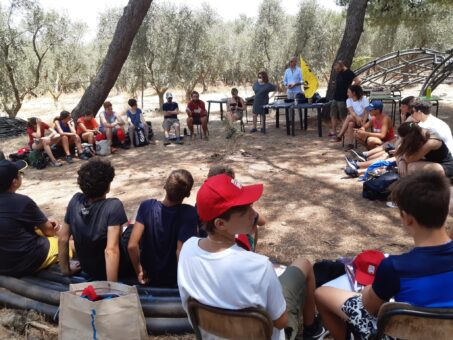
Jul 5, 2022 | Non categorizzato
Since 2017, in lands confiscated from the mafia in San Vito dei Normanni (Puglia- Italy), “XFARM Agricoltura Prossima” has hosted training camps organized by “Libera”, a network of Associations, involved in a commitment against the mafia and in favour of social justice. This year, some young people from the Focolare Movement took part. 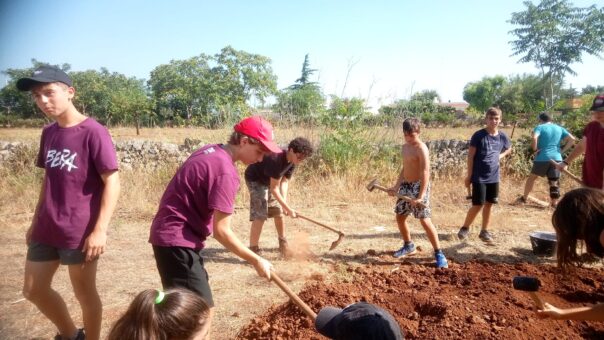 You see them handling the red earth of Puglia, in southern Italy, you observe them knead it with straw, you watch them shape the material to create something ecologically sustainable. And you think that what they are doing also has the force of a metaphor. They are aged 13-17 years old. They met in San Vito dei Normanni, in Brindisi, to contribute to the rebirth of an asset confiscated from the mafia gangs. They are mostly children of this land caressed by the sun and at this time of year, invaded by tourists. But they also come from Piedmont and Lombardy, where some people think that the mafia is only something to do with southern Italy. Not these young people. They came down here to Upper Salento to spend part of their holiday in a different way and to make a contribution to change. There are twenty of them, full of the energy and fun-loving, typical of their age. They’re spending 4 days here, protagonists in a project organized for them by Libera and the Focolare Movement.
You see them handling the red earth of Puglia, in southern Italy, you observe them knead it with straw, you watch them shape the material to create something ecologically sustainable. And you think that what they are doing also has the force of a metaphor. They are aged 13-17 years old. They met in San Vito dei Normanni, in Brindisi, to contribute to the rebirth of an asset confiscated from the mafia gangs. They are mostly children of this land caressed by the sun and at this time of year, invaded by tourists. But they also come from Piedmont and Lombardy, where some people think that the mafia is only something to do with southern Italy. Not these young people. They came down here to Upper Salento to spend part of their holiday in a different way and to make a contribution to change. There are twenty of them, full of the energy and fun-loving, typical of their age. They’re spending 4 days here, protagonists in a project organized for them by Libera and the Focolare Movement. 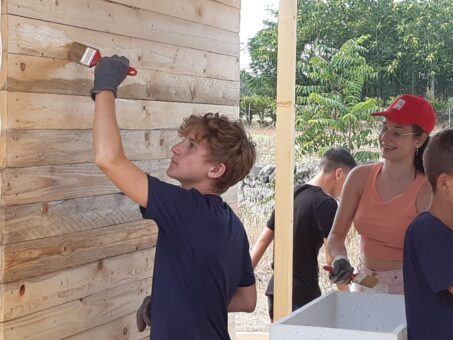 For a few hours a day, they work in the fields of social cooperatives that manage 50 hectares of olive groves and other structures taken from the “bosses”. And in their genuine commitment, you can perceive a desire to get their hands dirty, to roll up their sleeves, to actively bring something new, even in a land marked by the arrogance of the mafia. “This is our land, given back to the community”, they seem to say, as they work with clay, sand and silts to build wooden structures designed for a society in which everything can be circular. To guide them, the young people of the “Ex Fadda” urban laboratory and the “XFarm” project, a handful of enthusiasts of civil economy, active citizenship, and good practices in agriculture who after various experiences around the world found themselves here, in the land where the United Sacred Crown once ruled, to experience a new model of coexistence, to try to realize the dream of communities actively involved in regenerative processes.
For a few hours a day, they work in the fields of social cooperatives that manage 50 hectares of olive groves and other structures taken from the “bosses”. And in their genuine commitment, you can perceive a desire to get their hands dirty, to roll up their sleeves, to actively bring something new, even in a land marked by the arrogance of the mafia. “This is our land, given back to the community”, they seem to say, as they work with clay, sand and silts to build wooden structures designed for a society in which everything can be circular. To guide them, the young people of the “Ex Fadda” urban laboratory and the “XFarm” project, a handful of enthusiasts of civil economy, active citizenship, and good practices in agriculture who after various experiences around the world found themselves here, in the land where the United Sacred Crown once ruled, to experience a new model of coexistence, to try to realize the dream of communities actively involved in regenerative processes.  A utopia created here, a stone’s throw from the wild beauty of Torre Guaceto (Brindisi, Italy), thanks also to the “strength of the We”. Many different associations, secular and Catholic, trade union forces such as the Italian General Confederation of Labour, contribute to provide a common ground wherein to engage with the construction of a more united society, more attentive to preserving the environment and to working for social justice. “Memory is hope, commitment, it is something that characterizes us and pushes us not to repeat the mistakes of the past”, say the children, when the “E! State Liberi” project managers encourage them to reflect on that concept so central to the history of the network of associations created by Don Luigi Ciotti. Memory that becomes alive with the touching testimony of the Fazios, a couple whose son Michael, the same age as the listeners, was killed at the age of sixteen in the alleys of Bari Vecchia because he ended up in the middle of a settlement of accounts between gangs with which he had nothing to do. “Io stoc do”, “I’m here”, Lella says today, as she proudly did before to the wives of the mafia bosses who thought that after the murder they would leave the neighbourhood and the city. They remained, to obtain justice, to identify and then grant forgiveness to those who killed Michael, but also to try to offer a different future to that region of Italy, stained with the innocent blood of their son. “We are here”, repeat those fresh faces who today work in the fields, taking a stand to remind us that a better world is still possible. Just start by taking some land and try to do something worthwhile with it. One mother, when her son returned home after the camp, said, “I saw a light, a brightness in his eyes that I have never seen before. He told me that he had never experienced anything like this before”.
A utopia created here, a stone’s throw from the wild beauty of Torre Guaceto (Brindisi, Italy), thanks also to the “strength of the We”. Many different associations, secular and Catholic, trade union forces such as the Italian General Confederation of Labour, contribute to provide a common ground wherein to engage with the construction of a more united society, more attentive to preserving the environment and to working for social justice. “Memory is hope, commitment, it is something that characterizes us and pushes us not to repeat the mistakes of the past”, say the children, when the “E! State Liberi” project managers encourage them to reflect on that concept so central to the history of the network of associations created by Don Luigi Ciotti. Memory that becomes alive with the touching testimony of the Fazios, a couple whose son Michael, the same age as the listeners, was killed at the age of sixteen in the alleys of Bari Vecchia because he ended up in the middle of a settlement of accounts between gangs with which he had nothing to do. “Io stoc do”, “I’m here”, Lella says today, as she proudly did before to the wives of the mafia bosses who thought that after the murder they would leave the neighbourhood and the city. They remained, to obtain justice, to identify and then grant forgiveness to those who killed Michael, but also to try to offer a different future to that region of Italy, stained with the innocent blood of their son. “We are here”, repeat those fresh faces who today work in the fields, taking a stand to remind us that a better world is still possible. Just start by taking some land and try to do something worthwhile with it. One mother, when her son returned home after the camp, said, “I saw a light, a brightness in his eyes that I have never seen before. He told me that he had never experienced anything like this before”.
Gianni Bianco
Jul 4, 2022 | Non categorizzato
Chiara Lubich spoke to young people in very clear terms. This is what happened at the 1992 Supercongress at the Palaghiaccio in Marino (Italy) when they asked her what they should do to limit consumerism. We need to live and spread the “culture of giving,” of giving. If you want my advice, it is this. At the beginning of the year, each of you should make a small bundle, as we call it, of all the things you have that are surplus to your needs. You might only have a few, but you will have something. It might be a book, a toy, a pencil, a knapsack that you don’t use anymore, some clothes… something, anything that’s over and above what you need. Gather these things together and take them to your centers, either to the Teens for Unity centers or the Gen centers. Then since you are very industrious and organize so many projects and so on, you can sell these things at a mini market, a raffle, or other opportunities you can create, to raise some money to give to boys and girls who are in need. … Bear in mind that you should keep for yourselves only what you really need, just like plants that absorb from the earth only the water, minerals, and other things they need, and no more. Likewise, each one of us should have only what we need. Everything else should be given away, to be put in common with others. Of course, you will experience that by giving, you will receive all kinds of things. This is the experience of our Movement all over the world. Why will you receive? Because the Gospel says: “Give” – this is the culture of giving – “and there will be gifts for you” and it goes on to say, “… a full measure” – like having an apron full of wheat – “a full measure pressed down, shaken together, and running over, will be poured into your lap.”[1] In other words, you will receive many things from all over, from a man you know, from a teenager, from your teacher, from your mother – you’ll be given many things. … So, spread the culture of giving. You can tell your experiences, as you already do, which is so edifying for people. You can say, for example, that you gave away one thing and then received another…. Tell your experiences, all these gospel events, that you see the Gospel promises coming true. You could talk about them or write about them; make drawings or videos, short videos, or on the television news programs you are already doing for children. By doing all this, you will create a mentality in everyone, the mentality of the culture of giving.
Chiara Lubich
(Lubich, Chiara. “Ai Gen 3, [To the Gen 3] 1981 – 1995, Città Nuova, 2006, p. 66-68) [1] Lk 6:38
Jul 1, 2022 | Non categorizzato
The Encyclical, “Laudato Sì” helps us to look for ways to relax and rest in respectful harmony with the planet and the cultures it hosts, collaborating for greater sustainability. What are the choices we make when planning a trip? Do we only think of beautiful scenery, a place where we can rest or do we also think about the encounter with the environment, with people and their cultures? Here are some tips to live our holidays in a sustainable way.
- Rediscover our relationship with nature, noticing all its richness. When we visit places other than the one in which we live, we are invited to become aware of our Common Home, its beauty, its variety and breadth. It is important to take care of these places where we will live for a while and take the opportunity to integrate with the local people and the surrounding nature. It is always enriching to be open to an experience of encounter, of discovery of biodiversity, of natural resources (LS 151).
- Discover the local culture.Sometimes the riches of the place are set aside for the pursuit of conveniences for tourism. Respect for the culture of each place is central so that its identity is not lost. Before going on a journey, it can be helpful to do some research on that place, its people and its ecosystems, to get to know the local organizations that look after the conservation and protection of nature; to go there, aware of the value of its people and its territory and, since you only love what you know, we will be able to enlarge our hearts to an increasingly planetary dimension. The disappearance of a culture may be as or more serious than the disappearance of an animal or plant species (LS 145).
- Appreciate the wisdom of the original populations.Pay attention to indigenous communities and their cultural traditions. They are in fact fundamental interlocutors to get to know how the land is used and their customs. Many of these cultures respect the earth as a gift from the Creator and take care of the heritage of their ancestors as sacred spaces. It is necessary to respect them and interact with them to uphold their identity and values (LS 146).
- Support the conservation of natural areas and minimize the damage caused by our stay.Sometimes, it seems that many attitudes that we try to have throughout the year, are put aside during the holiday season. It is important to take care of the environment with actions such as: avoiding the use of plastic and paper material, reducing water consumption, differentiating waste, cooking only what you will eat, taking care of all living beings, turning off unnecessary lights. These are just a few examples to be able to have a generous attitude that shows the best of the human being (LS 211).
- Moderate energy consumption (air conditioning and heating).We can carry out small concrete actions in our daily life, as we mentioned in the previous point. Protecting energy resources is vital for our planet. Therefore, in summer, use air conditioning only as necessary. In winter, cover yourself a little more instead of turning on the heating. With these small savings, we contribute to a global movement that helps reduce the use of fossil fuels (LS 211).
- Try ecological transport: walks, bicycles, public transport.The quality of life in cities is associated with the development of good public transport that allows the movement of those who need to travel for work or leisure. It can be an enriching experience to use the means of transport of the local population. It can allow us to better understand their reality, avoiding adding other vehicles to the roads and may even be a better way to reach the places we want to visit (LS 153).
- Enjoy the simplicity to live in freedom.Sobriety does not consist in living every moment less, but in living it more intensely, enjoying simplicity, taking the time to get to know the place and its people, which allows us to value and respect every living being. We can leave our opinions and suggestions with the locals who have hosted, nurtured and/or guided us on our tours. This dialogue generates the reciprocity and motivation that these people need to improve and better welcome visitors (LS 223).
- Contemplating the cultural and technological works of every place.Find out about the museums to visit, the technological initiatives, the buildings that tell the identity of the place. “Technoscience, when well directed, can produce important means of improving the quality of human life” (LS 103).
- Fully integrate these moments of rest into our personal and community life.The value of rest is part of the spiritual life of many religions. Incorporating contemplative activities favours our spiritual growth in this path. It means to move onto another level, towards a fruitful dialogue with others and with nature. This rest motivates us not only to take care of the environment, but also to be generous and help the people most in need of the place we visit (LS 237).
- Consider the destination of our holiday and our trip a privileged space to experience interiority.Through the practice of worship of all kinds, we can embrace all the realities of the world. The hand that blesses is an instrument of the Creator’s love and a reflection of his closeness in the journey of life (LS 235).
EcoOne Southern Cone *
*Network of professors, academics, researchers and professionals working in the field of environmental sciences. **LS: Excerpts from paragraphs of Laudato Sì interpreted to take responsibility for tourism and rest.
Jun 30, 2022 | Non categorizzato
The life of Jesus brings us the wonderful message of God’s mercy, Love that envelops and forgives everything. Building peace means putting it into practice in everyday life, to discover the beauty of a gift that revives people and makes them free. And there was peace My sister had been fighting with a friend for months. I invited her to my house one day to try and help her make peace. Before she arrived, however, I told my granddaughter Sandra, aged eight, about the problem and asked her to help me. She gladly said yes. I went straight to the point with my sister, but there was nothing to be done, she did not intend to forgive. Before leaving, she approached Sandra who was playing, asked her about the school, if she had learned to write: “Yes, if you give me a page, I’ll show you.” She casually wrote something. When my sister read it, she immediately became thoughtful and her eyes filled with tears. Sandra had written this sentence: “To live the art of loving you have to love everyone, be the first to love, love your enemies…” My sister said “I needed her to tell me what I should have done a long time ago!” and immediately she went to make up with her friend. (N.G. – Cameroon) Forgiveness that heals When I was nineteen, my father abandoned us and the pain and resentment of this accompanied me for years. As if to make up for that emptiness, when I got married, Nat and I always tried to keep our family together. Our children absorbed this atmosphere of love to the point that, when my husband was anxious, lost his patience and raised his voice, it was touching to see how the children, not at all frightened, embraced him, almost to appease his agitation. Their tenderness towards their father helped to dissolve the anger I felt towards my father; the wound I still had because of the suffering of that abandonment began to heal. Then one day I strongly felt the urge to forgive my father. I did it deep in my heart, but that wasn’t enough. So I talked to Nat about it, and together we went to find him. We found him and even thought I was shaking, I was able to make peace with him, also on behalf of the others in my family. I will never forget the feeling of serenity and freedom experienced on that occasion. (N.M.A. – Philippines) Laundry I live in a neighbourhood of houses separated from each other only by a wall on which we usually hang out our clothes to dry. One day, realizing that my neighbour’s laundry was already dry, I asked her son to remove it because I had to clothes to dry too. They took offence and started cursing. There were two plants on that wall that I had grown with great care. In the evening I heard a thud. When I went to see what was happening, I realized that my neighbours were dropping the second vase. Inside I felt myself seething with indignation, but the words about the land belonging to the meek came to me so I said to myself: “It doesn’t matter”. When my mother-in-law saw that I was not reacting, she said to me: “Give me the cane, I’m going to teach them a lesson”. I had to persuade her to be patient too. The situation remained tense for some time. Then one day, to our surprise, the neighbour knocked on our door. There was no water in her house and she asked if she could do her washing in our house. It was an opportunity to reconnect and in welcoming it, I realized how much she had changed. (R. – Pakistan)
Edited by Maria Grazia Berretta
(taken from Il Vangelo del Giorno, Città Nuova, year VIII, n.2, May-June 2022)
Jun 28, 2022 | Non categorizzato
The 10th World Meeting of Families just concluded. “Be the seed of a more fraternal world” was Pope Francis’ mandate to all those families present. “The Church is with you, indeed, the Church is in you!… May the Lord help you every day to remain in unity, peace, joy, and perseverance in difficult moments too.” With these wishes Pope Francis greeted participants at the 10th World Meeting of Families, during the concluding Mass on 25 June in St. Peter’s Square. It was presided over by Cardinal Kevin Joseph Farrell, Prefect of the Dicastery for the Laity, Family and Life. The celebration was preceded by intense days that, touching on various themes, highlighted the witness of so many families from all over the world. They were days that many lived in their own dioceses, creating, as the pope called it, “a sort of immense constellation.” “They were moments full of beauty that touched us deeply, and we were truly able to experience God’s love for us, and for each family in the world,” says Keula, a member of the New Families Movement, an offshoot of the Focolare. She came to Rome with her husband Rogerio from Brazil. Forgiveness, openness to life, accompanying children, the role of the elderly, and hope in providence were just some of the themes discussed during this 10th World Meeting of Families. Held at the close of the Year of Amoris Laetitia Family, it had listening and consultation between family and marriage pastoral workers at its heart, with the goal of developing the theme chosen by the pope this year – “Family love: vocation and way to holiness”. Among the stages of this journey were discussion about the shared responsibility of spouses and priests in the pastoral care of particular churches, the concrete difficulties of families in today’s societies, the preparation of couples for married life, and training the trainers in family pastoral care, which is full of challenges. “We realized these past days how much the family can be a strength for the whole world today,” said Suse and Angelo from Korea. It is a force that must be defended and accompanied, and it can find a welcoming home in the Church and even become its expression. In line with the readings from the liturgy, the pope also spoke of the importance of freedom during his homily in St. Peter’s Square, “one of the most-valued goods sought after by modern and contemporary man.” It takes shape when lived in the family sphere. “All of you spouses, forming your family, with the grace of Christ have made this courageous choice: not to use freedom for yourselves, but to love the people God has placed beside you. Instead of living as ‘islands,’ you have put yourselves ‘at each other’s service.’ “This is how you live freedom in the family! There are no ‘planets’ or ‘satellites’, each traveling in its own orbit. The family is the first place where we learn to love.” It is precisely in service that the family responds to its calling and moves forward on the path of family love, an outgoing love that is “always open, extroverted, capable of touching the weakest… fragile in body and fragile in soul,” continued Pope Francis. “Love, in fact, even family love, is purified and strengthened when it is given.” Keeping our feet firmly planted on the ground, realising the challenges of our time, but with our eyes always fixed on heaven – all this could be found in the missionary mandate to families that the Holy Father read at the end of the celebration. It was a true mandate: the invitation to respond to this call toward holiness and walk together. “Be the seed of a more fraternal world. Be families with big hearts, be the welcoming face of the Church.”
Maria Grazia Berretta
Jun 27, 2022 | Non categorizzato
In October 1946, Chiara Lubich wrote to Sister Josefina and Sister Fidente who were trying to put into practice the spirit of the emerging Movement. This excerpt from the letter captures the enthusiasm and ardour of the early days and spurs us, even today, to put God first in our lives. “God of my soul, my Love, my All, You speak to these two little hearts. Speak with Your Divine Voice. Tell them that You alone are Everything and that YOU LIVE IN THEM! Tell them not to search for you outside of themselves, but to always find you there, in their heart! You know already, Jesus, how much I love them and always want to be with them. … GOD ALONE IS EVERYTHING! And this Truth must be lived out through a burning love for Poverty! When is it that we love You, Lord? When we find You When is it that we can be sure of having found You? When we trust only in You and madly turn our gaze on high and seek only You: God–Our-Father! And now that your Brides are stripped of everything and are convinced that you alone suffice: now speak to their hearts telling them that you also accept (as I also gratefully and joyfully accept) the burning love that I bear them and the heartfelt desire to make of them what my heart would like to be for You! … My little sisters, How much good your life could accomplish, similar as it is to the life of Jesus when He lived and worked and loved in the little house of Nazareth! But don’t you realize that a soul who lives in this way, living life as a couple (Jesus and the soul), does as much as if she were out preaching to the entire universe? Now that you are stripped of your misery, which you will daily give over to God, you are free to love LOVE! He wants to live with you. And there’s nothing He desires more than this life as a couple.
Chiara Lubich
(Chiara Lubich, in Early Letters: At the origins of a new spirituality New City Press, Hyde Park, New York 2012 pp. 69-70)
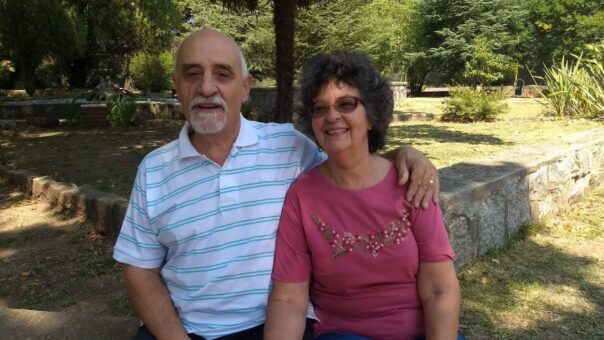
Jun 23, 2022 | Non categorizzato
Family love: vocation and way to holiness. This is the theme of the Tenth World Meeting of Families being held in Rome from 22 to 26 June 2022. The voice and witness of several couples from “New Families “, a branch of the Focolare Movement, taking part in the event. 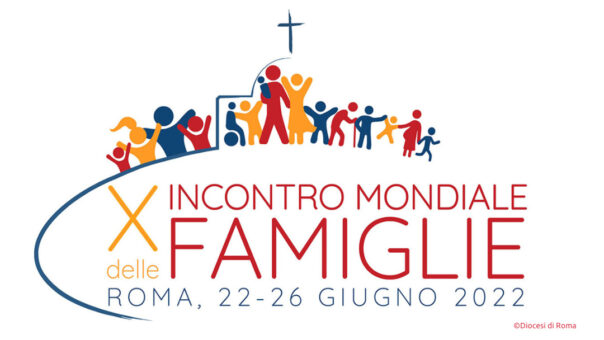 A moment of celebration and sharing to be embraced by the Church, “family of families” (Al 87) and to feel an integral part of this people on a journey. From 22 to 26 June 2022 Rome will host the Tenth World Meeting of Families, an event initiated by St John Paul II in 1994 and repeated every three years since then in different locations. The meeting, as announced by Pope Francis in a video message, is this year being held in a “multi-centred and widespread” form, responding to the needs dictated by the pandemic and the desire of so many to participate. In fact, many families around the world will be following the event from their respective dioceses, while others will have the joy of experiencing this moment in person. “This is the third time we have participated in the World Meeting of Families and each time we really bring home a load of gifts”.
A moment of celebration and sharing to be embraced by the Church, “family of families” (Al 87) and to feel an integral part of this people on a journey. From 22 to 26 June 2022 Rome will host the Tenth World Meeting of Families, an event initiated by St John Paul II in 1994 and repeated every three years since then in different locations. The meeting, as announced by Pope Francis in a video message, is this year being held in a “multi-centred and widespread” form, responding to the needs dictated by the pandemic and the desire of so many to participate. In fact, many families around the world will be following the event from their respective dioceses, while others will have the joy of experiencing this moment in person. “This is the third time we have participated in the World Meeting of Families and each time we really bring home a load of gifts”.
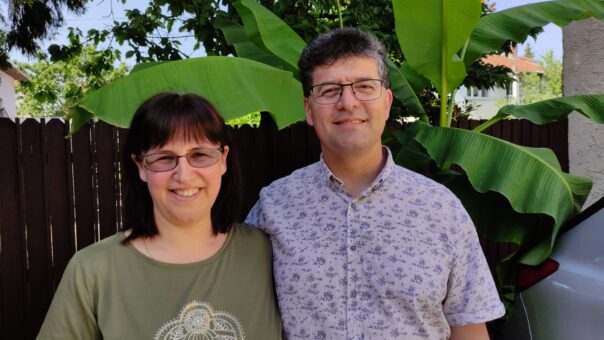
Istavan and Dori Mezaros (Serbia)
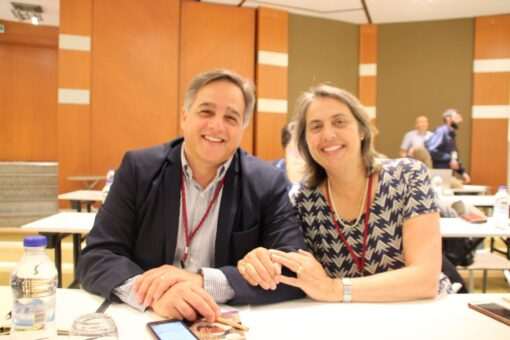
Liliana and Ricardo Galli, Brazil

Joao and Soraia Giovani, Argentina
Maria Grazia Berretta
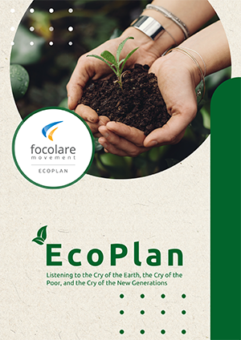
Jun 22, 2022 | Non categorizzato
“We are commited to verifying the ecological sustainability of our structures and activities … We are dedicated to the creation of greater environmental awareness that will lead to more sustainable lifestyles.” Ecological conversion was one of the goals set by the Focolare Movement in the 2021 General Assembly. In response to this urgent need, the Focolare EcoPlan was initiated. “The Focolare Movement is deeply committed to ecological conversion through concrete actions and by fostering dialogue with all for the protection of our planet,” said Margaret Karram, at the opening of the fifth Halki Summit a few days ago. “Stimulated by our General Assembly at the beginning of 2021, we have decided to take courageous action through the creation of an ecological plan within our communities to bring about change and make our lives and our activities more sustainable.” 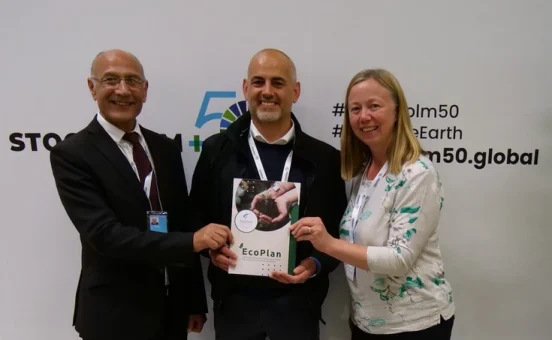 In fact, on 3 June 2022 in Stockholm, acting on behalf of all its communities, the Focolare Movement was able to present its own document – Focolare EcoPlan – which demonstrates its commitment to the environment. The presentation of EcoPlan was motivated by the spirituality that has given life to the Movement. It was officially handed over to Iyad Abu Moghli from Jordan, UNEP Senior Principal Advisor and director of the Faith for Earth Initiative, who said that the EcoPlan is “an ambitious and comprehensive ecological approach.”
In fact, on 3 June 2022 in Stockholm, acting on behalf of all its communities, the Focolare Movement was able to present its own document – Focolare EcoPlan – which demonstrates its commitment to the environment. The presentation of EcoPlan was motivated by the spirituality that has given life to the Movement. It was officially handed over to Iyad Abu Moghli from Jordan, UNEP Senior Principal Advisor and director of the Faith for Earth Initiative, who said that the EcoPlan is “an ambitious and comprehensive ecological approach.”

Download PDF
Carlos Mana
https://youtu.be/B9SSOE_yzxk
Jun 21, 2022 | Non categorizzato
On 20 June 2022 a conference was held in Rome on ‘The Identity of Movements and New Communities on the Synodal Path of the Church’ promoted by the Pontifical Lateran University and the Sophia University Institute. Increasing and deepening dialogue between hierarchical and charismatic gifts, between the institutional Church, Movements and New Communities. Cardinal Marc Ouellet’s wish is that these times, characterised by the synodal journey, may bring about a broader awareness of the charisms present in all the ecclesial communities. These words of the Prefect of the Congregation for Bishops and President of the Pontifical Commission for Latin America express the important stage in the conference “The Identity of Movements and New Communities on the Synodal Path of the Church” held yesterday at the Pontifical Lateran University and promoted jointly with the Sophia University Institute. At the centre of highly qualified speeches were the journey and open questions on these new expressions of the Spirit that require up-to-date answers which measure up to a continuously and rapidly changing world. Card. Kevin Farrell, Prefect of the Dicastery for the Laity, Family and Life, identified four areas of challenge that this journey presents today: dynamic fidelity to the charism, unity, synodality and missionary spirit: “The new perspectives that the Holy Spirit opens up before us always present themselves as challenges, something that does not leave us in peace because the Spirit is dynamism, it is creativity, it is life”.
How, then, is it possible to carry out an updating that has to be done in multiple environments: formation of members, evangelisation activities, activities to help and heal society’s deepest wounds? The variety and complementarity of responses and contributions offered by representatives of the Movements and New Communities provided a panorama on the current status of these ecclesial realities. Margaret Karram, president of the Focolare Movement, stressed how “In these times when the whole Church is moving towards a synodal approach, we are called to take a step further: to walk together, united, not just within our own realities, but together with everyone”. It is only by networking, by being a gift for the Church and humanity that the Movements will also discover their own identity in a new way. Mary Healy, professor of Sacred Scripture (Sacred Heart Major Seminary in Detroit, USA) highlighted formation, evangelisation and the primacy of the charismatic dimension as the three main fruits that Movements and New Communities have been bearing since the Second Vatican Council: gifts brought to the Church and humanity, founded on a personal and communitarian encounter with Christ. Speaking about “The Ecclesial Movements and New Communities in the current kairos of the synodal process”, Mons. Piero Coda, theologian and Secretary General of the International Theological Commission and lecturer at Sophia University Institute, highlighted a challenge that is still open: the provisional nature of the configuration of these ecclesial realities with regard to their recognition in the canonical order. The care of the Church in this phase provides a foretaste, in the current dynamic ecclesiological context, to new and more mature arrangements’. The session on “Foundation, Development and Incarnation of the Charism” was then entrusted with providing a representation of the Movements and New Communities. Moysés Louro de Azevedo Filho, Founder and General Moderator of the Shalom Catholic Community, presented the spirit and aims of this ecclesial expression that is “the bearer of a charism summed up in the word spoken by Jesus when he met the disciples in the Upper Room: “Shalom”, towards communitarian holiness”. Daniela Martucci, vice-president of the Comunità Nuovi Orizzonti highlighted the heart of its charism: listening to the cry of Jesus Crucified and forsaken in the poor, the least and the discarded as well as the cry of love of the God-Man who continues to repeat: “love one another as I have loved you”. Iraci Silva Leite emphasised the centrality of the Word of God that guides the experience of the “Fazenda da Esperança”, a Word that “unites us, particularly in our efforts to live love among ourselves and to give those who suffer the presence of Jesus”. Michel-Bernard De Vregille of the Emmanuel Community touched on the theme of crises that ecclesial realities have encountered and continue to encounter: “There is often the risk of wanting to set charism and institution against each other,” he said. “However, the torch of the hierarchical and institutional Church and the torch of the charism are made to meet together and become a bright and beautiful flame illuminating the world with the presence of the Risen Lord”. For the aspect of incarnation, Prof. Luigino Bruni, an economist, focused on the ‘narrative’ challenge of charisms born in a historical period often recounted in ways that are typical of the founding period. “Updating is needed together with the charism,” he said, “without losing touch with the charism’s fundamental core. A new narrative potential will come from the pluralism of languages, from various experiences, from the dialogue between people with different sensitivities: young people and adults, academics and ordinary people, Church and movements, etc.” In the afternoon, work focused on how charisms can and should develop all aspects of the life of members and communities, from the spiritual to the organisational, by including members of different vocations, to formation, to the administration of assets and all forms of responsibility and governance. Prof. Elena Di Bernardo, Professor of Canon Law (Institutum Utriusque luris, Pontifical Lateran University) offered a highly qualified excursus on the relations between theology and canon law, as they have been realised and evolved over time. ‘It must be assumed that the identity in itself of a Movement or ecclesial reality,’ she observed, ‘is fully acquired when all the charismatic aspects constituting it have received adequate juridical configuration’. At the close of the proceedings, the report by Dr Linda Ghisoni, Undersecretary of the Dicastery for the Laity, Family and Life, entitled “Laity today in the ecclesiology of communion”, highlighted two polarities to which attention must be given: person-institution and praxis-statutes. With regard to the former, she observed that ‘the institution, Movement or new community, will be preserved if its original charism, its proper purposes in which prayer and apostolate are combined, and, above all, will be preserved if the good of the persons who make it up is safeguarded. The latter can never be an alternative to the good of the institution!” Stressing how experience painfully teaches us that whenever the ‘good name’ of the community has been preserved by sacrificing individual persons and their rights, aberrations have been committed that are detrimental to the institution as a whole. He concluded: ‘The person at the centre, always, constitutes an investment in the community or movement. The other polarity instead concerns practice and statutes: if it is true that ‘life undoubtedly anticipates every normative definition’, it is also true that any legalism or demonisation of law must be avoided, which ‘far from being a necessary evil to be endured by drawing up a list of articles, constitutes a path of freedom for all: for all members and for those who are personally called upon to be its guarantors, particularly for those who hold positions of government, at all levels’.
Stefania Tanesini
Jun 20, 2022 | Non categorizzato
Jesus affirmed that we are already made clean by virtue of the Word He proclaimed to us. Therefore, it is not so much rituals that purify the soul, but His Word insofar as we are able to put it into practice. It leads us to have our hearts always set on God alone. The Word of Jesus is not like human words. Christ is present in his Word, as he is present, although in another way, in the Eucharist. Through his Word Christ enters within us and, provided we allow him to act, he makes us free from sin and therefore, pure of heart. Thus, purity is the fruit of living the Word, all the Words of Jesus which free us from the so-called attachments, into which we inevitably fall if our heart is not in God and in his teachings. These could be attachments to things, people, ourselves. But if our heart is set on God alone, all the rest falls away. To achieve this, it can be useful to repeat throughout the day, to Jesus, to God, the invocation of a Psalm which says: “You, Lord, are my only good” (cf. Psalm 16:2) [1] Let us try to repeat it often, especially when the various attachments seek to pull our heart towards those images, feelings and passions which can blur the vision of good and take away our freedom. Are we inclined to look at certain advertising posters, to watch certain television programs? No, let’s repeat to him: “You, Lord, are my only good”. Re-declaring our love for God will be the first step towards going out of ourselves. And by doing so we will have gained in purity. Do we sometimes feel that a person or an activity is coming between us and God, like an obstacle that mars our relationship with him? It is the moment to repeat: “You, Lord, are my only good.” This will help us to purify our intentions and regain inner freedom. Living the Word makes us free and pure because it is love. The divine fire of love purifies our intentions and all our inner self, because the Bible considers the “heart” to be the deepest seat of intelligence and will. But there is one love which Jesus commands us to practice and which enables us to live this beatitude. It is mutual love, being ready to give our life for others, following the example of Jesus. It creates a current, an exchange, an atmosphere whose dominant note is precisely that of transparency, purity, because of the presence of God, who alone can make us pure of heart.[2] It is by living mutual love that the Word produces its effects of purification and sanctification. As isolated individuals we are incapable of resisting at length the solicitations of the world. Instead, mutual love provides a healthy environment capable of protecting the whole of our authentic Christian existence, and in particular, our purity.
Chiara Lubich
(Chiara Lubich, in Parole di Vita, [Words of Life] Città Nuova, 2017, pp. 616-618) [1] Cf. Psalm 16,2 [2] Cf. Psalm 50, 12
Jun 17, 2022 | Non categorizzato
Put God at the centre of life and be assured that you will not waver. We can experience a deep sense of consolation by living what is expressed in the words of this psalm – a sense of feeing guided in our actions and knowing, deep in our hearts, that only He makes all things good. Seeds of Peace In our apartment block there was a growing attitude of discontent relating to the administration, repairs and noise. One day I was reflecting on the words of a priest: he had said that peace begins within us, in our conscience where we find the seed of truth that is God. This is a seed that germinates and grows when charity is put into practice in everyday life. I talked about the situation with my family and we came up with the idea of making some small improvements in the building every day, without telling other people what we were doing. For example, we decided to remove the dead leaves from the plants at the entrance and water them and we cleaned the glass and frames of the paintings in the foyer, which had perhaps never been dusted since they had been hung on the wall. Of course, these were the tasks that the people paid for cleaning should have carried out but at the following tenants’ meeting, the administrator pointed out that for a while, everyone had begun to feel that the environment was more welcoming and people began to share ideas about painting the staircase. When I reported this to the children, they were enthusiastic. A contribution to improving the world can start in even in one’s own apartment building. (C. – Croatia) The “bundle” to share From the very beginning of our marriage, we shared everything with one another. One day, my wife and I sat around a small table, trying to set up the family economy. Beyond the figures in themselves, the income and expenditure marked a growth in the quality of the relationship between us. We also involved our children. From then on, it became normal for a little used a pair of shoes, for example, to be seen as useful to someone else or for our indispensable outgoings to include a sum of money for a neighbour in need. A further step was the so-called ‘bundle’ to share with others: the focus of this was to give away what was not really needed. Only later did we realise the importance of what we had done. We felt that we had begun to relate to people who could need anything. Even a pencil, a book or a blanket became a sign of caring for others. This attitude renewed our lives. (L.R. – Holland) Trust I had lost my job, but I was confident that God’s Providence would help me find another one: had I not experienced many times that my efforts to put Gospel love into practice would be answered by “give and it will be given to you” (Lk 6:38) ? That very day, in the parish, I had to meet with a group of people and recount my experience as a Christian. At the end, I also mentioned that I was looking for a job. A girl who was present at that meeting told me that they were looking for an employee in her father’s company. That is how, by trusting, I found work. (F.I. – Italy)
Edited by Maria Grazia Berretta
(Taken from Il Vangelo del Giorno, Città Nuova, year VIII, no.2, May-June 2022)
Jun 16, 2022 | Non categorizzato
On Sunday, 19th June, 2022, the new website of the Igino Giordani Centre will go online. The site is dedicated to this writer and politician, co-founder of the Focolare. Alberto Lo Presti told us that it is a completely revamped space, where you can meet “Foco” and get to the heart of his life. “Once someone said that if, by chance, all the Gospels disappeared from the earth, Christians should be such that, just by looking at their lives, the Gospel could be rewritten. Igino Giordani was that kind of Christian.” The words of Chiara Lubich, in describing the extraordinary figure of Igino Giordani (to whom she gave the name of Foco), allow us to grasp the beauty that lies behind the adventure of one who is considered a co-founder of the Focolare Movement. Hero of the last century, engaged on various fronts, from political, to social, to cultural, Giordani is still relevant today. The Igino Giordani Centre, founded by Chiara Lubich, will launch its new website on 19th June 2022 to showcase and protect his legacy. Alberto Lo Presti, at the helm of the Centre, told us about it. Prof. Lo Presti, where did the idea of creating a new site dedicated to Igino Giordani come from and what is new about it? We live in a challenging era from many points of view: peace and war, justice and inequalities, migration and welcome, work and unemployment… and since Igino Giordani has dealt with these issues with wisdom and inspiration, there are many people searching through his speeches, writings and testimonies, to find a light that might guide them in their current choices. This is why we decided to improve the website, completely renewing it, adapting it with the latest graphics and functionality. In this way we will give access, to those who are interested, to the main sources that illustrate his thought and life. How can the person of Foco make his way into the present day and be an inspiration also for the new generations? At the venerable age of 70+, Igino Giordani was considered a “myth” by many young people and teenagers who frequented the gardens of the International Centre of the Focolare Movement in Rocca di Papa (Italy), and came across him, sitting on a bench. They loved to spend time with him, to talk about serious matters or simply to share what they were living. Today, young people still need myths and heroes and often look for them in the most unlikely places (sports, cinema, video games, social media, influencers). To get to know Igino today, means getting to know the story of a real hero, who really had to go to war, who really chose peace, who really challenged the people in power to remain consistent with their ideals. Usually it is thought that youth is the time of ideals, which then with adulthood, are destined to collapse. Igino remained young to the last because, as he loved to say, “You never get old in the spirit”. Exploring his experience means listening to his teaching: living for the ideal of unity was the most exciting thing that happened to him. And alongside the improved functionality of the site and its new graphic layout, there is also a new Instagram page, already online, the first official channel entirely dedicated to Igino Giordani (Igino_giordani_official), to facilitate access to him, a citizen of the world and a real influencer of our time.
Maria Grazia Berretta
Jun 15, 2022 | Non categorizzato
It’s not something you can learn from books – the art of supporting each other. But helping someone with their studies and devoting time to them can be the right opportunity to discover wonders and reap unexpected rewards, even in a place like prison. That’s what happened to Marta Veracini, giving her a new look on life. Laughing out loud while a voice in the distance whispers not to disturb; exchanging ideas and opinions, attempting to concentrate and stay in the books. This scene repeats daily in study halls of universities, between coffee breaks and on the way to a new class. All this and much more happens to Marta Veracini, a young woman from Tuscany, Italy, every time she hears the armoured doors close behind her at Dogaia, the prison in Prato (near Florence). A law graduate with a master’s degree in criminology, Marta joined the University of Florence’s organised civil service project in 2019. In it volunteers assist inmates preparing for university exams. Since then, even after the year ended, she continued her service – there in a place that anyone would have a hard time calling ‘beautiful’. Yet in surprising and unexpected ways, it has become a space dedicated to care and mutual trust, a place where relationships are a ‘welcoming home’, and where everyone, inmate or not, can finally be themselves. ‘I am always asked how it feels to bring comfort and help in a place like prison,’ says Marta. ‘The truth is that no one really understands how much you can receive, even in that context. ‘Volunteering in prison changed my life. It allowed me to break down the barriers of my shyness, my insecurities and allows me today to show off a smile that I used to hide. It is I who have to thank the people I have met for all they have done for me and continue to do. ‘I am truly free with them.’ It is a real achievement. There are so many cells that can imprison us, in fact, that can hold back our dreams, our thoughts, our hopes. Marta’s experience, together with those of the inmates she has had the good fortune to meet and help with their studies over the years, are an example of how together it is still possible to take flight, to feel that you are worth something and – why not – think about the future. ‘The university path is definitely tiring for everyone,’ Marta says, ‘but they work so hard, and it is good to see their grit and joy in passing an exam. These are great little milestones, where they face tough subjects. ‘Many, for example, are studying law, and some have already graduated. There are young people as well as adults from various regions of Italy, or foreigners. It is good to see how they set no limits, spur each other on and become examples for each other. ‘For those with long sentences, it means investing strength and time to achieve something that makes them proud, and makes their families outside proud. Those who are released have the opportunity to use what they have studied to be able to start over.’ Hers is a look of hope that embraces and allows itself to be embraced. The stories of daily life within the walls of Dogaia, captured in the book Marta wrote during the pandemic, My guardian angel has a life sentence, are a small drop in a great sea of indifference that divides the inside from the outside. Yet they are a testimony to how it is possible to break down barriers by generating beauty and putting unconditional love for one’s neighbour at the centre. ‘I have never wanted to know why each of them is in prison,’ Marta continues, ‘but one thing is certain: I have never looked at them as “monsters” – just people who, although with mistakes behind them, have the same needs, feelings and hope as others do to relate and share. ‘They are people who have dignity like everyone else, and thanks to them, I also found mine. In short, true friends.’
Maria Grazia Berretta
Jun 13, 2022 | Non categorizzato
The Fifth Halki Summit, was held in Istanbul, Turkiye. Four days of talks and discussion on care for the environment for the future of the planet. At the end of the fifth Halki Summit, entitled “Sustaining the Future of the Planet Together,” we said our goodbyes in an atmosphere of warmth and friendship. The international, interdisciplinary meeting was organized jointly by the Ecumenical Patriarchate of Constantinople (Istanbul) and the Sophia University Institute, Loppiano (Italy). It was inspired by the prophetic teaching of Patriarch Bartholomew and Pope Francis and all agreed that it was an event of the Holy Spirit. Not by chance, the Summit was held in the week between the two dates of Pentecost in our respective Churches. The sincere communication and mutual attentiveness, as well as the open exchange of ecclesial approaches and reflections, led us to discover that we are at a decisive turning point for the future of the human family, in which each person has a responsible part to play. The challenge or opportunity to which we are called is that of developing a shared ecological ethos. As artisans of peace and fraternity, we wish to implement good practices in every sphere, whether educational or pastoral, social, economic or political. We committed ourselves to work on interdisciplinary pathways for the formation of new paradigms that can interpret and transform reality and overcome the culture of waste. It became clear that effective action can only be achieved through non-elitist education, in which the Churches are actively engaged. At the end, all participants wished to make an appeal “to the Churches and those who care about our common home”. We hope not to leave this event behind us as a beautiful memory, but instead, starting from our own conversion, nourished by evangelical wisdom, to work together for real change in the capacity to care. “Ecological culture”, Pope Francis reminds us, “Cannot be reduced to a series of urgent and partial responses to the immediate problems of pollution, environmental decay and the depletion of natural resources. There needs to be a distinctive way of looking at things, a way of thinking, policies, an educational programme, a lifestyle and a spirituality which together generate resistance to the assault of the technocratic paradigm. Otherwise, even the best ecological initiatives can find themselves caught up in the same globalized logic. To seek only a technical remedy to each environmental problem which comes up is to separate what is in reality interconnected and to mask the true and deepest problems of the global system” (Laudato Si’, no. 111).
Vincenzo Di Pilato (Photo: Alfonso Zamuner, Noemi Sanches e Nikos Papachristou)
Jun 13, 2022 | Non categorizzato
The Word of Life of June 2022, “You are my Lord, I have no good apart from you ” proposes that we recognise Jesus in all circumstances of life, especially in the most difficult moments of physical or spiritual pain. Through his abandonment, Jesus himself became our access to the Father. His part is now done. It’s up to us to take advantage of this great grace. Each one of us has to do our own small part, which requires that we approach the gate and pass through it. How? When we suffer because of a sudden disappointment, or are distressed by an unexpected misfortune or an absurd illness, we should recall that Jesus took on himself the pain of all these various trials, and a myriad of others, too. Yes, Jesus forsaken is present in everything that causes us to suffer. Every pain we experience bears his name. So let’s try to recognize Jesus forsaken in all the distressful and difficult situations of life, in all our dark times, in our personal tragedies and those of others, in the suffering of humanity that surrounds us. All these are him because he made them his own. All we have to do is to tell him, with faith, “You, Lord, are my only good.”[1] It would be enough to do something practical to lessen “his” suffering in the poor and in those who are distressed, for us to go through the gate and find beyond it a joy never experienced before, a new fullness of life.
Chiara Lubich
(Chiara Lubich, from the Word of Life of April 1999) [1] See Ps 16:2.
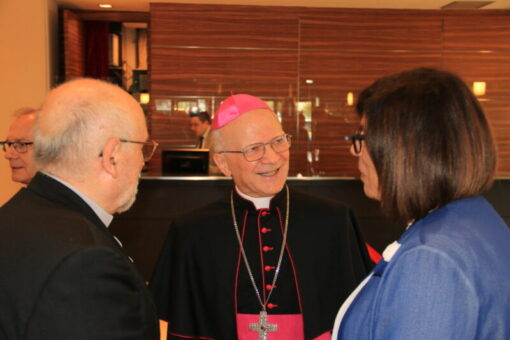
Jun 9, 2022 | Non categorizzato
The 5th Halki Summit jointly organized by the Patriarchate of Constantinople and the Sophia University Institute began on 8th June, 2022, in Turkey. We had a dream… 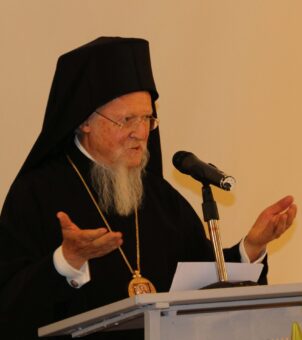 Yes, it was January 2019 and a delegation from the Sophia University Institute (IUS) visited the Ecumenical Patriarch Bartholomew in the Phanar, the historic Greek quarter of present-day Istanbul (Turkey). We were also welcomed very warmly by Metropolitan Elpidophoros of Bursa, then Abbot of the Monastery of the Holy Trinity on the island of Halki and Professor of the Theological School of the University of Thessaloniki (he became Archbishop of America the following May). We experienced a deep communion with him which gave rise to the desire to organize together a Summer School in Halki with Catholic and Orthodox students and teachers, on the theme of ecology, so dear to both the sister Churches of Rome and Constantinople. The pandemic delayed it but today that dream has come true.
Yes, it was January 2019 and a delegation from the Sophia University Institute (IUS) visited the Ecumenical Patriarch Bartholomew in the Phanar, the historic Greek quarter of present-day Istanbul (Turkey). We were also welcomed very warmly by Metropolitan Elpidophoros of Bursa, then Abbot of the Monastery of the Holy Trinity on the island of Halki and Professor of the Theological School of the University of Thessaloniki (he became Archbishop of America the following May). We experienced a deep communion with him which gave rise to the desire to organize together a Summer School in Halki with Catholic and Orthodox students and teachers, on the theme of ecology, so dear to both the sister Churches of Rome and Constantinople. The pandemic delayed it but today that dream has come true. 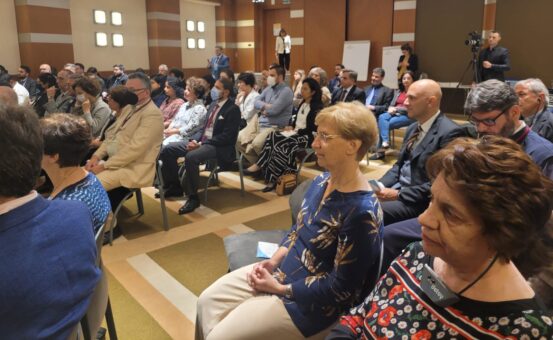 It is 6.30 pm on Wednesday, 8th June, 2022 and we are once again in the “queen of cities”, as the beautiful city of Constantinople was called, with good reason. Patriarch Bartholomew gave a passionate and informative greeting to participants, students and teachers from all continents and with very varied interdisciplinary and ecumenical experiences. The audience included Msgr. Marek Solczynski, the new Apostolic Nuncio to Turkey, Msgr. Vincenzo Zani, Secretary of the Congregation for Catholic Education, Archbishop Elpidophoros and Margaret Karram, President of the Focolare Movement and Vice-Chancellor of the IUS. “Everything is in a relationship of love” said Margaret Karram, recalling the destiny of unity embedded in the universe, that today more than ever, man and woman are called to promote with bold, prophetic action and thought. The title of the fifth Halki Summit organized jointly by the Patriarchate of Constantinople and the IUS, which began on Wednesday, 8th June, is a clear indication of this: “Sustaining the future of the planet together”. It is no coincidence that Patriarch Bartholomew emphasized two words from this title: “future” and “together”. The first refers to the strong intergenerational bond inherent in respect for the environment in which we live; the second to the mandatory interdisciplinary approach to be taken in the face of the vastness and complexity of ecological problems. He said, “It becomes evident that only a cooperative and collective response by religious leaders, scientists, political authorities, educational institutions and financial organizations will be able to effectively address these imperative issues of our time”.
It is 6.30 pm on Wednesday, 8th June, 2022 and we are once again in the “queen of cities”, as the beautiful city of Constantinople was called, with good reason. Patriarch Bartholomew gave a passionate and informative greeting to participants, students and teachers from all continents and with very varied interdisciplinary and ecumenical experiences. The audience included Msgr. Marek Solczynski, the new Apostolic Nuncio to Turkey, Msgr. Vincenzo Zani, Secretary of the Congregation for Catholic Education, Archbishop Elpidophoros and Margaret Karram, President of the Focolare Movement and Vice-Chancellor of the IUS. “Everything is in a relationship of love” said Margaret Karram, recalling the destiny of unity embedded in the universe, that today more than ever, man and woman are called to promote with bold, prophetic action and thought. The title of the fifth Halki Summit organized jointly by the Patriarchate of Constantinople and the IUS, which began on Wednesday, 8th June, is a clear indication of this: “Sustaining the future of the planet together”. It is no coincidence that Patriarch Bartholomew emphasized two words from this title: “future” and “together”. The first refers to the strong intergenerational bond inherent in respect for the environment in which we live; the second to the mandatory interdisciplinary approach to be taken in the face of the vastness and complexity of ecological problems. He said, “It becomes evident that only a cooperative and collective response by religious leaders, scientists, political authorities, educational institutions and financial organizations will be able to effectively address these imperative issues of our time”. 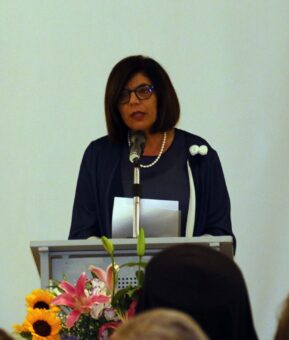 At the end of his speech, he referred to two concepts very dear to Orthodox theology and spirituality: “Eucharist” (in the sense of “thanksgiving” for the gift of creation) and “asceticism” (understood as “self-control” of consumerist passions). However, the Patriarch invited us to consider these concepts not simply in a liturgical or monastic sense, but as different ways of speaking about communion. “And this is where the vision of our brother Pope Francis,” he admitted with emotion, “coincides with the vision of the world that we have proposed and promulgated for over thirty years. We are both convinced that what we do to our world, ‘we do to the least of our brothers and sisters’ (Mt.25:40), just as what we do to others we do to God himself (cf. Mt.25:45). It is no coincidence that immediately after publishing the encyclical on the environment Laudato Sì, the next encyclical of Pope Francis was Fratelli Tutti”.
At the end of his speech, he referred to two concepts very dear to Orthodox theology and spirituality: “Eucharist” (in the sense of “thanksgiving” for the gift of creation) and “asceticism” (understood as “self-control” of consumerist passions). However, the Patriarch invited us to consider these concepts not simply in a liturgical or monastic sense, but as different ways of speaking about communion. “And this is where the vision of our brother Pope Francis,” he admitted with emotion, “coincides with the vision of the world that we have proposed and promulgated for over thirty years. We are both convinced that what we do to our world, ‘we do to the least of our brothers and sisters’ (Mt.25:40), just as what we do to others we do to God himself (cf. Mt.25:45). It is no coincidence that immediately after publishing the encyclical on the environment Laudato Sì, the next encyclical of Pope Francis was Fratelli Tutti”.  There are many joint statements by the Pope and the Patriarch, together with the Archbishop of Canterbury, on the urgency of environmental sustainability, on social impact and on the importance of global cooperation. This is also what Pope Francis writes in Laudato Sì: “When we fail to acknowledge as part of reality the worth of a poor person, a human embryo, a person with disabilities … it becomes difficult to hear the cry of nature itself, everything is connected. (no. 117) The Patriarch clarifies the same concept, putting it in context: “Connections between us and the entire creation of God, between our faith and our action, between our theology and our spirituality, between what we say and what we do; between science and religion, between our convictions and every discipline; between our sacramental communion and our social conscience; between our generation and future generations, between our two churches, but also with other churches and other communities of faith”. Yes, everything is connected by a bond that only mutual love between people can make visible to every man and woman on this wonderful planet earth.
There are many joint statements by the Pope and the Patriarch, together with the Archbishop of Canterbury, on the urgency of environmental sustainability, on social impact and on the importance of global cooperation. This is also what Pope Francis writes in Laudato Sì: “When we fail to acknowledge as part of reality the worth of a poor person, a human embryo, a person with disabilities … it becomes difficult to hear the cry of nature itself, everything is connected. (no. 117) The Patriarch clarifies the same concept, putting it in context: “Connections between us and the entire creation of God, between our faith and our action, between our theology and our spirituality, between what we say and what we do; between science and religion, between our convictions and every discipline; between our sacramental communion and our social conscience; between our generation and future generations, between our two churches, but also with other churches and other communities of faith”. Yes, everything is connected by a bond that only mutual love between people can make visible to every man and woman on this wonderful planet earth.
Vincenzo Di Pilato (Foto: Alfonso Zamuner)

Jun 8, 2022 | Non categorizzato
Call for projects with an ecological impact addressed to the local communities of the Focolare Movement. Rules and conditions for participation. Proposals will be accepted until 30 June 2022. https://www.youtube.com/shorts/hflKLGLCPE0 What is the project The “Seed Funding Program” aims to sustain and encourage significant and promising initiatives in different parts of the world towards the creation of local/national ecological plans for people and planet within the Focolare communities. The main goal is to build local ecological plans within the Focolare communities to journey together towards an integral ecology. Our inspiration The world faces a complex social and environmental crisis. The Encyclical Laudato Si’ from Pope Francis explains how the cry of the poor is completely interconnected with the cry of the planet. We cannot consider our relationship with nature as separate from fraternity, justice and faithfulness to others. Chiara Lubich, the founder of the Focolare Movement, argued that it is by starting with small local problems that a moral conscience is formed that is capable of addressing problems on a global scale. In fact, Chiara continued: what is missing is not technical and economic resources but an extra soul, which means new love for mankind, to make us all feel responsible towards everyone. Participate!  The SFP is looking for youth-led and intergenerational initiatives (ongoing or future initiatives) that aim at a change in our personal and communitarian lifestyle, envisioning a sustainable relationship between nature and human beings, and working within a local context. 10 projects will be selected and will be funded with up to 1000 euros. An international and interdisciplinary jury will select the projects according to the following criteria:
The SFP is looking for youth-led and intergenerational initiatives (ongoing or future initiatives) that aim at a change in our personal and communitarian lifestyle, envisioning a sustainable relationship between nature and human beings, and working within a local context. 10 projects will be selected and will be funded with up to 1000 euros. An international and interdisciplinary jury will select the projects according to the following criteria:
- The project should be oriented towards integral ecology (in favor of people and planet);
- The project should involve intergenerational efforts with young people playing a significant role in the leadership and implementation of each project;
- The project must involve the local community (possibly at a national level); and
- The project should show how spiritual values motivate ecological action (possibly with an ecumenical and interreligious dimension).
Submit your ecoplan and be part of this path together! https://www.new-humanity.org/fr/project/seed-funding-program/ In order to participate in this call, you may need to fill out some crucial information. Do not miss the framework and the call for projects survey.
The deadline to complete your application is June 30th, 2022. You will hear whether your project was successful to receive seed-funding by July 15th, 2022. Once successful for funding, you would commit to taking first steps within your project between July and September 2022 and we would love to see your first report by the end of October 2022. For more information, feel free to contact us at ecoplan@focolare.org More information about the Faith Plan for People and Planet at https://www.faithplans.org/
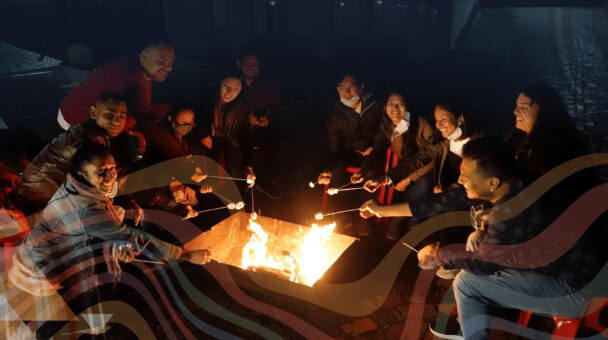
Jun 7, 2022 | Non categorizzato
While much of the population of Latin America adheres to the Catholic Church, for many years there has been a growing sense of awareness among different churches. Often by working together on social issues, Christians from different traditions are able to experience real unity. Of particular importance is the Week of Prayer for Christian Unity, which in the southern hemisphere is celebrated between Ascension and Pentecost. More and more it’s the youth who are taking the lead to get things done.  Young people have always been attracted by the unknown, by what is different from themselves, by all that something new can bring, even in the realm of religion. So youth are always more open to those from another church to their own. This is precisely the experience of Ikuméni, a workshop for young Latin American Christians belonging to different churches and Christian traditions. “From the first day, I realised it was going to be challenging for everyone present, starting with me because the people I meet on a daily basis are nearly all Catholics like myself. In this course, everything was new and every participant came from a different church”, explains Carolina Bojacá, a young Focolare member from Colombia.
Young people have always been attracted by the unknown, by what is different from themselves, by all that something new can bring, even in the realm of religion. So youth are always more open to those from another church to their own. This is precisely the experience of Ikuméni, a workshop for young Latin American Christians belonging to different churches and Christian traditions. “From the first day, I realised it was going to be challenging for everyone present, starting with me because the people I meet on a daily basis are nearly all Catholics like myself. In this course, everything was new and every participant came from a different church”, explains Carolina Bojacá, a young Focolare member from Colombia.  In this formation journey, these young Christians from different traditions become travelling companions, in what is proving to be a real innovation in the ecumenical field. Starting from their shared faith in Christ, each one is prepared to serve actively in areas like sustainable development, peace and humanitarian aid. Carolina continues, “In August 2021 I participated in the online course for young people on good practice in ecumenism and inter-religious dialogue. There was a great atmosphere among us all from the start, and we all wanted to get to know each other better and build good relationships. As we tackled each theme, we quickly realised we would not be able to make progress unless we let go of all those prejudices or preconceptions that are often nurtured within a community and which block us from opening our minds and hearts to welcome each other. It’s the only way to discover the beauty of what unites us and also the differences that make us who we are as a church or group, without them being an impediment to working together for a more fraternal world. As the months went by, we got to know each other and eventually we managed to meet face to face. It was great to feel how strong our bond had become, to be able to give each other a hug, to pray together, to dialogue and discover the diversity and richness in each one, and in myself too!” As part of the course, the young participants prepare for a program of service. As it says in “Serving a Wounded World in Interreligious Solidarity”, the 2020 joint document by the World Council of Churches and the Pontifical Council for Interreligious Dialogue, Christians must now recognize the urgency to get involved with people of other religions in expressions of interreligious solidarity. So Carolina and her group rolled up their sleeves, as she explains. “In December, together with another youth member of the Focolare Movement who attended the same course, we thought of taking gifts to an indigenous community who had been violently displaced from their homeland to the outskirts of Bogotá. We proposed the idea to the others on the course and got a very positive response. Many contributed gifts and prayed for us, showing how even if we belong to a different church, our motivation is love inspired by Jesus, the model for all of us. At the end of the course we all gathered in Buenos Aires, Argentina. Each of us presented the actions inspired by the program not only to our fellow Ikuméni course mates, but also to some members of other religions who were invited. They happily shared their ideas and their own practical actions. It was a special moment of openning up to interreligious dialogue”. For many it was a completely new experience, a testimony of how fraternity can be built from personal commitment and effort combined with a great desire to get to know each other and do great things all together. “So now we’ve completed the course,” said Carolina, “but it’s only the first step to respond to a personal calling. We’ll continue to strengthen our relationships, help each other in actions which open up our hearts and continue working to make a united world something real”.
In this formation journey, these young Christians from different traditions become travelling companions, in what is proving to be a real innovation in the ecumenical field. Starting from their shared faith in Christ, each one is prepared to serve actively in areas like sustainable development, peace and humanitarian aid. Carolina continues, “In August 2021 I participated in the online course for young people on good practice in ecumenism and inter-religious dialogue. There was a great atmosphere among us all from the start, and we all wanted to get to know each other better and build good relationships. As we tackled each theme, we quickly realised we would not be able to make progress unless we let go of all those prejudices or preconceptions that are often nurtured within a community and which block us from opening our minds and hearts to welcome each other. It’s the only way to discover the beauty of what unites us and also the differences that make us who we are as a church or group, without them being an impediment to working together for a more fraternal world. As the months went by, we got to know each other and eventually we managed to meet face to face. It was great to feel how strong our bond had become, to be able to give each other a hug, to pray together, to dialogue and discover the diversity and richness in each one, and in myself too!” As part of the course, the young participants prepare for a program of service. As it says in “Serving a Wounded World in Interreligious Solidarity”, the 2020 joint document by the World Council of Churches and the Pontifical Council for Interreligious Dialogue, Christians must now recognize the urgency to get involved with people of other religions in expressions of interreligious solidarity. So Carolina and her group rolled up their sleeves, as she explains. “In December, together with another youth member of the Focolare Movement who attended the same course, we thought of taking gifts to an indigenous community who had been violently displaced from their homeland to the outskirts of Bogotá. We proposed the idea to the others on the course and got a very positive response. Many contributed gifts and prayed for us, showing how even if we belong to a different church, our motivation is love inspired by Jesus, the model for all of us. At the end of the course we all gathered in Buenos Aires, Argentina. Each of us presented the actions inspired by the program not only to our fellow Ikuméni course mates, but also to some members of other religions who were invited. They happily shared their ideas and their own practical actions. It was a special moment of openning up to interreligious dialogue”. For many it was a completely new experience, a testimony of how fraternity can be built from personal commitment and effort combined with a great desire to get to know each other and do great things all together. “So now we’ve completed the course,” said Carolina, “but it’s only the first step to respond to a personal calling. We’ll continue to strengthen our relationships, help each other in actions which open up our hearts and continue working to make a united world something real”.
Carlos Mana
Jun 6, 2022 | Non categorizzato
In 1976, during the first Gen School, Chiara Lubich answered questions from many young Focolare members from all over the world. Referring to what she was living in those days she said the following I read … a writing of mine which you too may have read its short and says: “Jesus forsaken, embraced, held tightly to oneself, consumed in one with us, we consumed in one with Him, made suffering with Him… suffering: this is how you become God, Love.” Those words touched me in a special way because I wrote them during a time of great light, so I wrote things greater than I could actually live, or if I did live them, it was as a young person. The more I go ahead the more I discover their value and depth. … I liked it very much and the Holy Spirit made me focus on this point of not being two of us: me and Jesus forsaken, that is, me and the suffering I experience, me and the doubt I have, I discovering Him and little by little embracing Him, saying to Jesus… taking time., no, at once! Made suffering with Him suffering, wanting that alone, this is how you become God, how you become God! Love, Love. Then, … I had just received a card from Loppiano in which Father Mario Strada had sent me, besides his letter, a few photos of his new little church at Cappiano, I think, photos of some beautiful frescoes. One of them had this sentence written beneath it: “Nox mea (my night) obscurum non habet” (my night has no darkness). I was very happy about this, as though the Lord had sent it to me, because – as I said – this is what I want to live. As soon as a suffering arrives, I must embrace it so quickly, I must hold it tightly to myself, consume it in one, made suffering with Him suffering. This is how you become, not suffering, but Love, God. … I have seen, gen, that living this all day long, is like a tonic of the Ideal that you can’t imagine… unimaginable! Because you start in the morning. You might be a little tired, you didn’t sleep well perhaps. So, tiredness, amazing, “My night has no darkness”, this suffering does not exist because I love it. I get up, and I might hear about some problems at once. Someone says: “Chiara, I need to tell you something.” And I say within: fantastic, Jesus, here we are, I embrace you, hold you tightly, made suffering with you, at once… “My night has no darkness.” And this all day long. I believe that we can progress spiritually more in a week by living this one thing than in months and months living in other ways. And this applies to all suffering; you’re suffering because your feet hurt; you’re feeling the cold; someone spoke a bit unkindly; you suffer about something you have to do; you suffer and …at once… – This is the way! … so that we can always proclaim, when we go to bed at night: Jesus, my night had no darkness. Truly, you feel that you can say (now, God must confirm this), that it is no longer we who live, but it is Love that lives within; it is God who lives within
Chiara Lubich
(Grottaferrata, 2 June 1976, at the Gen School) https://www.youtube.com/watch?v=34K64nLUofk
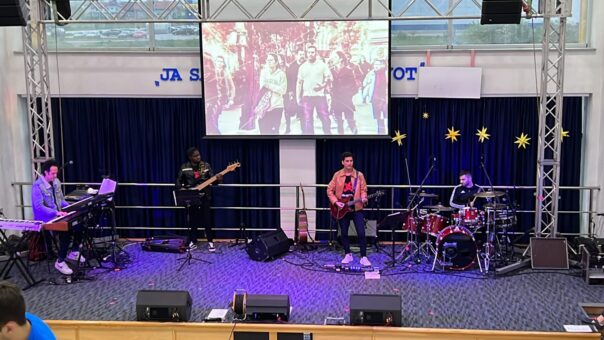
Jun 3, 2022 | Non categorizzato
On a journey to bring solidarity to migrants fleeing their countries due to war and persecution, Gen Rosso’s music leaves a wake of sharing and fraternity. “We face so many problems, but with you, with this kind of activity, we feel driven to move forward.”  These are the words of a migrant who fled Pakistan because of problems facing the country. Today he, like thousands of other migrants, is in a refugee camp in Lipa and Borići in Bosnia and Herzegovina and was able to meet Gen Rosso. From 4–8 May, the international performing arts group returned for a second time to locations on the “Balkan route,” where migrants fleeing their countries due to war or persecution travel every day. The goal of the trip was to bring solidarity and dignity to migrants, lift their hopes for a better world, strengthen their self-esteem, and breathe in the family atmosphere. It was organised with the help of Jesuit Refugee Service, which provides housing and essential aid to asylum seekers and migrants. “We had been here in October 2021,” says Michele Sole, one of the singers, “and it was a good feeling to return to familiar places. This time we went to a larger refugee camp in Lipa, where we met other refugees. The amazing thing is always to see how smiles and welcoming people without prejudice can make a difference and make their faces shine!” Welcoming gestures and small gifts during the brief moments experienced with them offered some a glimmer of joy and light. Another stop was to visit the John Paul II School in Bihać, where close to 100 children were able to participate in dance and singing workshops and attend two Gen Rosso concerts. Along with the pupils and their parents, some migrants from Pakistan, Afghanistan and Iran were also able to participate in the artistic events. “It was our way of trying to include everyone and experience how important and unimaginable the gift of sharing with this piece of suffering humanity is,” adds Michele. “I don’t know what happened to me this morning,” says a Muslim woman who was present, “but I felt your music inside, and moved and lucky to be here.” “Thank you, thank you really, for the passion and hope you gave us,” says an Afghan boy. “The singing was very beautiful.” “The concert was something special,” says Bihać Institute’s headmaster, adding to the chorus of messages of joy and hope. “We sincerely hope to meet again. It was a great honour and pleasure for us to have you here in our school.”
These are the words of a migrant who fled Pakistan because of problems facing the country. Today he, like thousands of other migrants, is in a refugee camp in Lipa and Borići in Bosnia and Herzegovina and was able to meet Gen Rosso. From 4–8 May, the international performing arts group returned for a second time to locations on the “Balkan route,” where migrants fleeing their countries due to war or persecution travel every day. The goal of the trip was to bring solidarity and dignity to migrants, lift their hopes for a better world, strengthen their self-esteem, and breathe in the family atmosphere. It was organised with the help of Jesuit Refugee Service, which provides housing and essential aid to asylum seekers and migrants. “We had been here in October 2021,” says Michele Sole, one of the singers, “and it was a good feeling to return to familiar places. This time we went to a larger refugee camp in Lipa, where we met other refugees. The amazing thing is always to see how smiles and welcoming people without prejudice can make a difference and make their faces shine!” Welcoming gestures and small gifts during the brief moments experienced with them offered some a glimmer of joy and light. Another stop was to visit the John Paul II School in Bihać, where close to 100 children were able to participate in dance and singing workshops and attend two Gen Rosso concerts. Along with the pupils and their parents, some migrants from Pakistan, Afghanistan and Iran were also able to participate in the artistic events. “It was our way of trying to include everyone and experience how important and unimaginable the gift of sharing with this piece of suffering humanity is,” adds Michele. “I don’t know what happened to me this morning,” says a Muslim woman who was present, “but I felt your music inside, and moved and lucky to be here.” “Thank you, thank you really, for the passion and hope you gave us,” says an Afghan boy. “The singing was very beautiful.” “The concert was something special,” says Bihać Institute’s headmaster, adding to the chorus of messages of joy and hope. “We sincerely hope to meet again. It was a great honour and pleasure for us to have you here in our school.”
Lorenzo Russo
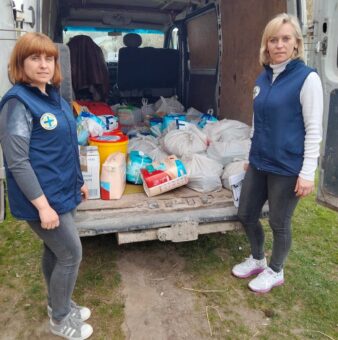
May 31, 2022 | Non categorizzato
We met Father Vyacheslav Hrynevych, director of Caritas-Spes Ukraine, when he was visiting Rome. He told us what is being done to support the Ukrainian people today, whilst also thinking of the future. 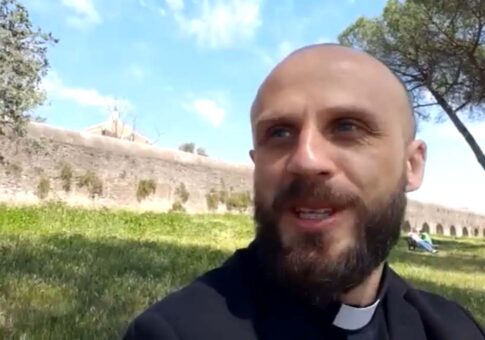 “The most difficult thing is that there is no end in sight to this war. In the last two weeks I have visited our centres in Chernihiv, Kharkiv, Getormel and the surrounding villages: there were poor people there before the war, but today they are even poorer because of the impact of all they have experienced. We want to organise psychological and spiritual accompaniment for them. Our volunteers could provide this.” Father Vyacheslav (Wenceslas) is the young director of Caritas-Spes Ukraine. He has a reassuring smile and the energy needed to endure and persevere in helping the population during this time of conflict in Ukraine.
“The most difficult thing is that there is no end in sight to this war. In the last two weeks I have visited our centres in Chernihiv, Kharkiv, Getormel and the surrounding villages: there were poor people there before the war, but today they are even poorer because of the impact of all they have experienced. We want to organise psychological and spiritual accompaniment for them. Our volunteers could provide this.” Father Vyacheslav (Wenceslas) is the young director of Caritas-Spes Ukraine. He has a reassuring smile and the energy needed to endure and persevere in helping the population during this time of conflict in Ukraine. 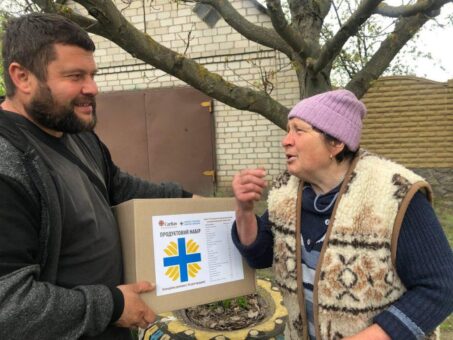 Visiting the different centres and cities, he was struck by some images, such as that of the Kharkiv metro, which is like a parallel underground city: “Some people live in the metro, they have organised themselves,” he explains, “There is a food distribution point, with times for breakfast, lunch and dinner, there is even a medical point, but people, including children, are living in the carriages of the trains. And when we proposed setting up an evacuation procedure, they replied that they wanted to stay, because that is their home and it is important to them. This is happening in all the stations and when something is missing on one side, for example, something like sugar, you get it from another station nearby, through the connecting tunnels. This is a beautiful image of the organisation of the Ukrainian people, but also an apocalyptic image of a country at war.”
Visiting the different centres and cities, he was struck by some images, such as that of the Kharkiv metro, which is like a parallel underground city: “Some people live in the metro, they have organised themselves,” he explains, “There is a food distribution point, with times for breakfast, lunch and dinner, there is even a medical point, but people, including children, are living in the carriages of the trains. And when we proposed setting up an evacuation procedure, they replied that they wanted to stay, because that is their home and it is important to them. This is happening in all the stations and when something is missing on one side, for example, something like sugar, you get it from another station nearby, through the connecting tunnels. This is a beautiful image of the organisation of the Ukrainian people, but also an apocalyptic image of a country at war.”  In the centres, besides providing meals for the day, there are also a number of different activities: some people stay with the children, others offer psychological support and some people distribute clothing: everyone is involved. When we ask about the children, Father Wenceslas tells us how he is struck by the fact that they seem to have accepted the war but without understanding its tragic and brutal nature. “One child,” he tells us, “explained to us, in a simple way, the difference between the sound of rain and the sound of shelling. For them and their families, psychological support is important and will be afterwards too. I think that 80 per cent of the children, if not more, are separated from their fathers who are at war. The women and children are either living outside the country or in shelters. One day we will have to do something to reunite these families. I have experienced this type of situation in 2014. Even then, when the men came back, they were not the same, they suffered from post-traumatic stress disorder. This is a big challenge and support will be needed years and years.” When we ask him about the end of the war, Father Wenceslas does not know how to give us an unequivocal answer: “The war does not end with an act of peace, the war remains in the memory, we will remember the bombings for the rest of our lives, the ugly images, the separated families, the dead friends… The war will end with forgiveness and we must work on this slowly, examining our consciences very deeply …”. Then a ray of hope breaks through: ‘I’m waiting for the day when I can go home and play five-a-side football with my friends. That will be a time of peace. People will be able to pray in churches without listening for the sirens. They will go to the churches to pray and for Mass and not to distribute or search for humanitarian goods and medicines, as is the case now. But at the moment, it’s hard to say what will happen. The situation is so dynamic and you can’t see any signs, any prospects of things ending.” War destroys people’s lives, and Father Wenceslas is grateful that at this time the Focolare Movement has chosen to stand alongside the Ukrainian people: “Seeing the faces of people who, in a very beautiful way, live the charism of the Focolare Movement, gives me a lot of hope. With those among them who live in Ukraine and collaborate with Caritas-Spes we do a great job, from morning to night, with great respect. I would also like to thank those who cannot help financially, but who are close to us in prayer, thank you. Even during this time of war we experience God’s love.”
In the centres, besides providing meals for the day, there are also a number of different activities: some people stay with the children, others offer psychological support and some people distribute clothing: everyone is involved. When we ask about the children, Father Wenceslas tells us how he is struck by the fact that they seem to have accepted the war but without understanding its tragic and brutal nature. “One child,” he tells us, “explained to us, in a simple way, the difference between the sound of rain and the sound of shelling. For them and their families, psychological support is important and will be afterwards too. I think that 80 per cent of the children, if not more, are separated from their fathers who are at war. The women and children are either living outside the country or in shelters. One day we will have to do something to reunite these families. I have experienced this type of situation in 2014. Even then, when the men came back, they were not the same, they suffered from post-traumatic stress disorder. This is a big challenge and support will be needed years and years.” When we ask him about the end of the war, Father Wenceslas does not know how to give us an unequivocal answer: “The war does not end with an act of peace, the war remains in the memory, we will remember the bombings for the rest of our lives, the ugly images, the separated families, the dead friends… The war will end with forgiveness and we must work on this slowly, examining our consciences very deeply …”. Then a ray of hope breaks through: ‘I’m waiting for the day when I can go home and play five-a-side football with my friends. That will be a time of peace. People will be able to pray in churches without listening for the sirens. They will go to the churches to pray and for Mass and not to distribute or search for humanitarian goods and medicines, as is the case now. But at the moment, it’s hard to say what will happen. The situation is so dynamic and you can’t see any signs, any prospects of things ending.” War destroys people’s lives, and Father Wenceslas is grateful that at this time the Focolare Movement has chosen to stand alongside the Ukrainian people: “Seeing the faces of people who, in a very beautiful way, live the charism of the Focolare Movement, gives me a lot of hope. With those among them who live in Ukraine and collaborate with Caritas-Spes we do a great job, from morning to night, with great respect. I would also like to thank those who cannot help financially, but who are close to us in prayer, thank you. Even during this time of war we experience God’s love.”
Riccardo Camillieri & Stefano Comazzi
Contributions can be made to: Azione per un Mondo Unito ONLUS (AMU) IBAN: IT 58 S 05018 03200 000011204344 Banca Popolare Etica Codice SWIFT/BIC: ETICIT22XXX Azione per Famiglie Nuove ONLUS (AFN) IBAN: IT 92 J 05018 03200 000016978561 presso Banca Popolare Etica Codice SWIFT/BIC: ETICIT22XXX Donations should be marked : Emergenza Ucraina
May 30, 2022 | Non categorizzato
If we put the words of the Gospel and Jesus’ commandments into practice, especially his commandment of mutual love, the Trinity will come to dwell in us. How can God dwell within Christians? What is the way to enter this deep union with God? The answer is to love Jesus, with a love that is not merely feelings but that translates into concrete action in daily life, and in particular by keeping his Word. When Christians love in this way, which is seen in what they do, God responds with his love and the Trinity comes and dwells within them. … Which words are Christians called to keep? In John’s Gospel, “my words” and “my commandments” are often synonymous. So, Christians are called to keep Jesus’ commandments. However, we shouldn’t think of them as a list of regulations. Actually, all of them are summed up in the command that Jesus demonstrated when he washed the disciples’ feet – the commandment of mutual love. God asks Christians to love one another to the point of giving themselves completely, as Jesus taught and did. …. How can we reach the point when the Father himself will love us and the Trinity come to dwell in us? By loving one another with all our hearts, radically and with perseverance. This love helps us find the way to live the deep Christian asceticism to which the crucified Christ has called us. In fact, living out mutual love causes various virtues to grow in our hearts, and this love is also the surest gauge of our personal holiness. Lastly, it is through mutual love that Jesus, the Risen Lord, is present in the hearts of individual Christians and in their midst.
Chiara Lubich
(Chiara Lubich, in Parole di Vita, [Words of Life] Città Nuova, 2017, pp. 262/3)
May 28, 2022 | Non categorizzato
The existence of struggling couples, separated couples and those in new unions is a cry for help in the world. The “New Families Movement”, a branch of the Focolare, endeavours to support these families. There are many couples in difficulty, who due to misunderstandings, lack of dialogue, coldness in their relationship, arrive at the extreme decision: separation. Families in crisis, torn apart, separated, new unions forming. Often problems between couples, small or large, cannot be resolved on their own but need help from the outside. The New Families Movement has been trying to help such families for many years, families who feel “different”, only because they have not had a straightforward path in life. Giulia and Andrea (names have been changed) are proof that despite the imperfections of life you can still be a family. During her adolescence she got to know the Focolare and discovered that the only ideal that is worth living: God-Love. Time passed, her friends got engaged, married, some consecrated themselves to God but for her a secure future has not yet appeared. She graduated, then her parents split up. “I experienced pain for my family that I discovered after almost 30 years, was different from what I imagined. Yet love is possible even after so many years, because I have experienced it in the “Ideal”!” Giulia moved city to pursue her work dream. One night a friend insisted that they go out with other friends for a village festival. So she met Andrea, nice and kind but he is separated and has two children. “No, thanks, was my answer to his calls inviting me out. I was upset because I didn’t want to and couldn’t have an affair with a separated person. How could I reconcile my life, my being a Christian with someone like him?” Life goes on but her heart was increasingly anxious. “I knew the Church’s teaching on these unions so I went to Mass but decided not to go to communion, since I didn’t feel worthy anymore. I decided to talk to the priest who knows me from childhood. And so we entrusted the situation to Mary”. Time went on. Julia says, “Getting to know him, I felt that this could be “my way” but this made me suffer, above all the thought of no longer being able to receive Jesus in the Eucharist. However, if this is the teaching of the Church, I would respect it and go on. Thus I remain faithful to Sunday Mass, even if without receiving Communion.” In 2016, an invitation came from New Families to participate in a conference in Rome for separated couples in a new union. “Andrea and I adhered to the proposal. On the one hand, I was afraid of the reaction that he might have, on the other hand I felt that this was an opportunity for us. It was three intense days. I saw Andrea involved and very happy. For me it was a sense of feeling at home with the person who is important to me, even if not canonically perfect. Andrea brought home the feeling of being a living part of the Church. Not marginalised due to a finite marriage but a member of a living Body, no longer excluded. I told Andrea that the family I wanted in my life had to be built on the love we had experienced in those days, that measure and dimension and if he agreed with this, then we could get married. Yes, a civil marriage, but the family that would be born had to have that seal: the measure of mutual love that we had discovered”. We were married in September 2017, in the Town Hall. “I thought that my great youthful desire to go into the world came true on the very day of our wedding, where all generations and cultures were represented, where there were people from various backgrounds, believers and non-believers, but all happy, sharing our joy. For years now, we have been part of a group of New Families, where there are couples who live the same situation as us and this gives us the opportunity to express ourselves freely without the fear of being judged. This no longer makes us feel “class B” but fully accepted and recognized as a family. It helps us in our journey as a couple not to close in on ourselves, to keep alive the dialogue between us in sharing with other couples, to cultivate positive relationships and good friendships”.
Lorenzo Russo
May 24, 2022 | Non categorizzato
Loving others by generating good, going beyond the objective limits that life imposes on us, beyond our prejudices, breaking down barriers to build fraternal bonds. This is the mandate of Jesus’ New Commandment, the hallmark of a Christian: reciprocity in love. Two pancakes We are two Christian newlyweds, and we don’t have much. Not long ago we learned that a girl from Burundi, who was also poor, had planted a tree and was harvesting its fruit to help the hungry. It had never occurred to us that we could do anything for the destitute: our family’s income barely covers our outgoings each month, so we were always waiting for the day when we would have something “superfluous” to give. But that girl’s example was moving; it encouraged us to set aside the proceeds from the sale of two pancakes a day, since we run a small shop in our neighbourhood. Now at the end of each month we always have a small fund for others, and although it is a small thing, this act of love helps us act more carefully as well. Someone who learned about our experience remarked that this gesture is like the widow’s offering from the Gospels. Yes, it is, and we are very happy about it. J. O., Kenya A floral tribute In our village there are few pharmacies. I did not like to go to the one closest to home, because the pharmacist was grumpy and always seemed angry. Since I was not the only one who had this negative impression, I decided not to go to that pharmacy anymore. But one Sunday at Mass, listening to the priest talk about loving our enemies, the pharmacist came to mind. Knowing her name, I took advantage of her feast day to bring her flowers. With that simple gesture, she was moved, revealing an unusual friendliness. For me it confirmed of the words of St. John of the Cross: “Where there is no love, put love and you will find love.” It’s an evangelical law that applies to every situation. After those flowers to the pharmacist, whatever difficult situation arises, I put that saint’s motto into practice, and it’s sure to have an effect. Even my children now know that to overcome difficulties in relationships it takes more love, and it is good to tell each other about these small or big daily victories. K., Serbia With open arms My husband is Catholic, I am Evangelical. We have learned to accept each other in our diversity. When our daughter was baptized in the Catholic Church, the Lutheran pastor was also present. Ever since then a friendship was born between the two pastors that has led to several initiatives: common prayers, peace rallies, a service for visiting the sick… I am responsible for ecumenical activities in my parish council, and out of love for the Catholic parish I also devote time to raising funds for Caritas. Since the opening of a reception centre for political refugees (mostly Muslims from Tunisia, Libya, Romania, Bosnia and Kosovo), collaboration between Catholic, Evangelical and Orthodox Christians has intensified. A couple of Romanian friends who left for their country temporarily entrusted their daughter to us, and in addition we “adopted” a Muslim family in need. Making others’ needs our own is a real asset to our family. Edith, Germany
Edited by Maria Grazia Berretta
From “Il Vangelo del Giorno”, Città Nuova, Year VIII, No. 2, May–June 2022.
May 23, 2022 | Non categorizzato
In this text, Chiara Lubich tells how the pact of mutual love with her first companions led them to experience the presence of Jesus in their midst. We too can have the same experience on condition that mutual love is the foundation. “On one occasion, … I was asked how we understood for the first time that Jesus was present in the midst of two or more united in his name. To answer this question in complete faithfulness to the Holy Spirit, I began by describing what came before that in our history. It was when, for example, we might have been killed by the bombings at any time and we, first focolarine, asked ourselves if there was a will of God that was especially pleasing to him so that we could live it at least during the last days of our life. I spoke of how Jesus’ new commandment was the answer – the commandment of mutual love, based on the measure of the love of Jesus, who gave his life for us. I spoke about the pact that followed: “I am ready to die for you,” “I am ready to die for you,” but then, of course, I explained at length what happened afterwards. Do you remember? We felt that our life had taken a qualitative leap forward, as if a net had lifted us higher; and for the first time, we experienced a peace we had never felt before. This is what we said and what we always say. We experienced a light that gave full meaning to all that concerned us. We had a new and steadfast will in the place of our own which was often so inconsistent in keeping resolutions. We felt a fresh, rare, effervescent joy, and a new, very lively, ardour and zeal… I explained how we had wondered, in those moments, what might have been the cause of all this. And how we understood that, in that moment, Jesus had come into our midst spiritually because we were united in his name, that is, in his love. Our peace, light, ardour, and joy, and so on, were signs of this. In fact, when he is present, there are all these effects; otherwise, there’s no point in fooling ourselves, he is not present. Therefore, I concluded, we understood that he was in our midst when we were able to experience his presence. In fact, believing in his presence isn’t only a matter of faith, believing because he said so. No, if Jesus is among us, we feel that he is present. We can experience this. This is what is so beautiful and great about this particular presence of his, to which we are called.”
Chiara Lubich
(Chiara Lubich, Conversazioni, Città Nuova, 2019, pp. 580/1)
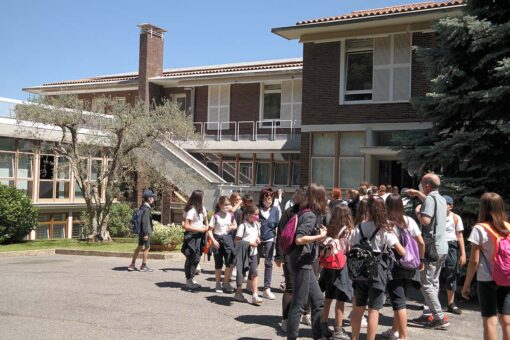
May 21, 2022 | Non categorizzato
The prizes and some commendations for the Schools Competition, held for the second time, have been awarded. This year over 3,000 students from 144 classes took part. On Thursday, 19th May, the award ceremony for the Italian National Competition “One city is not enough, Chiara Lubich Citizen of the world” was held for the second time. The Competition was organized by the Chiara Lubich Centre in collaboration with the Italian Ministry of Education, the Historical Museum Foundation of Trent and the Focolare’s New Humanity Movement.
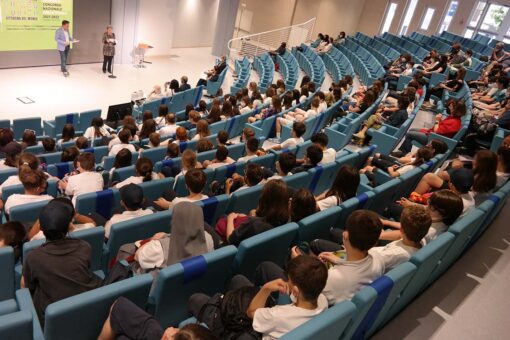
© CSC Audiovisivi
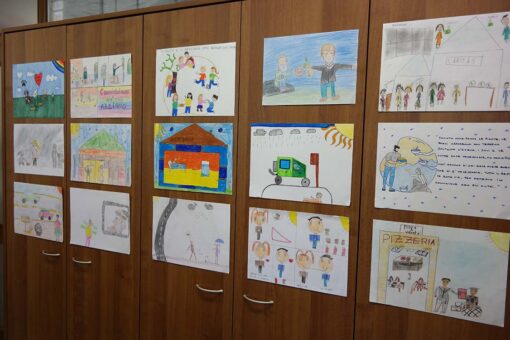
© CSC Audiovisivi

© CSC Audiovisivi
Lorenzo Russo
May 19, 2022 | Centro internazionale, Non categorizzato, Tutela minori
Significant steps forward are being taken to expand and strengthen measures concerning prevention, training, compensation, and the assessment of responsibility. These will guarantee justice to all victims and implement a culture in which absolute priority is given to charity, to the dignity of the person, and to safety and transparency in all areas of the Movement. “Today we are publishing a first response to the recommendations made by the Report issued by GCPS Consulting on the cases of child abuse by a former member of the Focolare Movement in France. We realise that these initial measures are not exhaustive, but form part of a decisive process of realignment of the life and activities of the Movement so that children and every person, in all their diversity, are at the centre of all processes concerning care, safeguarding, reparation and new beginnings“. With these words Margaret Karram, President of the Focolare Movement, presented the steps the Movement is now taking, thanks also to the recommendations made by GCPS Consulting. These measures are in addition to the Guidelines for the Safeguarding of Children and Vulnerable Adults (being followed in the Focolare Movement since 2014 and currently being revised according to international standards) and to the training courses on safeguarding for members of the Movement. “First and foremost,” she explained, “I wish to address all victims of sexual abuse, particularly in France. Personally and on behalf of the Movement I wish to thank you for your courage in sharing your testimony and your pain. For us they are the essential starting point in this process of purification. I also wish to thank the community of the Movement in France for its courage in the face of so much suffering. We now announce the establishment of a central disciplinary commission, which will have the task of assessing the responsibilities of the Movement’s leadership, in cases of abuse, in order to reach clarity and provide justice for the victims. Margaret Karram concluded, “First and foremost we are placing the Gospel at the basis of this process of renewal. We want to put the Gospel back at the centre of all we do. Moreover, the serious challenges that the world is experiencing today call for a renewed application of the spirituality of unity so that it can be an instrument of fraternity and peace.” The measures set out below will be implemented over the short, medium, and long term and are considered the most urgent and essential steps to set the Movement firmly on a path of reparation and positive new beginnings.
- Victims at the centre: the President’s personal request for forgiveness
The victims of abuse are the absolute priority in this process. Therefore, listening, asking for forgiveness, offering help and the path of reparation are the starting point. Margaret Karram has been in contact personally, when possible while respecting their privacy, with the victims in France. Her wish is to reach them all, while respecting those who wish to remain anonymous. A network for welcoming and listening to victims Local commissions for the welfare and safeguarding of children and vulnerable adults will be strengthened (where they already exist) or be set up wherever necessary and will include professionals in the fields of psychology, law, training, and education. These commissions are independent of the governance bodies of the Focolare Movement and will be the point of contact for allegations of abuse and have the task of initiating procedures. The local commissions will also serve as listening points and the first port of call for anyone wishing to share their experience of abuse, violence, distress, or traumatic experiences of any kind, also accessing – if requested – counselling to identify the next steps. In this respect, listening points are already active in some countries, such as France and Germany.
- Drawing up a protocol for the compensation of victims of abuse committed within the Focolare Movement
A Focolare Movement procedure for compensating victims is being drawn up.
- Establishment of a disciplinary commission
A central disciplinary commission will be established, made up for the most part of external professionals in the fields of law and psychology, to assess the responsibility of the leadership of the Focolare Movement in dealing with sexual abuse, spiritual abuse, and the abuse of authority. It will work on the basis of a disciplinary code, which will be drawn up in agreement with the Commission itself, and will establish ethical principles and sanctions.
- Publication of an annual report in the whole world
A report on the work carried out by the Central Commission for the Welfare and Safeguarding of Children and Vulnerable Adults (CO.BE.TU) on cases of abuse and on measures taken regarding prevention, and on the safeguarding of children, will be published annually.
- Safeguarding is the responsibility of all the Movement’s members
To strengthen this awareness, the Movement will enable every member, including children and those who wish to become members, to attend a foundation course on the safeguarding of children and vulnerable adults, organised by the local commissions for the welfare and safeguarding of children and vulnerable adults.
- Training courses for those in leadership roles
Courses are being prepared to train those in leadership roles – at whatever level they work – to implement forms of co-responsibility, greater transparency in decision-making processes, the alternating of roles, and training in accompaniment in the light of the distinction between the sphere of governance and the sphere of conscience.
- Opportunities for sharing and courses for the Focolare Movement’s wider communities
The wider Focolare communities in various localities should enable the necessary processes of discernment, open dialogue, and an understanding of correct relational dynamics. Following the publication of the Independent Inquiry by GCPS Consulting, many of the Movement’s groups and communities have already begun to have times of sharing and dialogue on issues regarding abuses. The Movement encourages such initiatives with the support of experts and professionals, where necessary or requested, taking into account different cultural sensitivities.
Stefania Tanesini
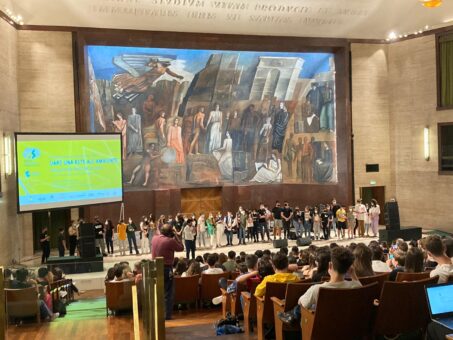
May 18, 2022 | Non categorizzato
The culmination of a whole year’s activity for the planet, the “A Network for the Environment” event in May 2022, welcomed a hall full of students, together with other colleagues linked online around the world.  Over 500 youth filled the splendid Aula Magna of Rome’s ‘Sapienza’ University on Friday 13 May 2022, to celebrate the conclusion of this academic year’s (2021-22) action for the “A Network to Protect the Environment” project. 10 institutes of higher education in the Lazio region of Italy sent representatives, with many other students from different parts of Italy and the world participating online, to review the fruits of their combined efforts. Throughout the year no less than 8,000 students from 89 schools in Italy and 12 other countries, accessed formation in energy saving. They were invited to sign a pact and 200 actions of personal energy saving were recorded. These actions were sponsored by relatives (at 0.10 cents per action), through the DPSAR App, raising money for several solidarity projects in areas of poverty and environmental damage due to climate change. A planetary perspective prompted by simple daily life. We spoke to project coordinator Andrea Conte, a specialist in Astrophysics and teacher of Mathematics and Physics at the Liceo Classico of Pescara, Italy. What do you mean by a “network” for the environment? This program of formation in environmental protection was first developed in Rome in 2008 by educationalist Elena Pace, a member of the Nuove Vie per un Mondo Unito (New Ways for a United World) Association. The original name of the project was “Giving to Protect the Environment” The introduction of the word “network” came about in 2019 and helped take the project to the next level. Each individual class continues to organize activities but is no longer on its own. Each pupil, with their classmates and the support of their family members, continues to act in favour of the Earth, but is now part of a network of many schools doing the same thing. We began by linking up schools within Italy and this network is already spreading beyond. Has radical change been brought about by any of these actions? The natural creativity of the students makes itself felt. One school in Rome, Italy, for example, decided to completely exclude the use of plastic bottles. But they opted for a scientific method to achieve this goal by inventing a form of “plasticometer” to weigh all the single-use plastic in the school. And every time someone discarded an empty plastic bottle, they made a commitment to use a re-usable water bottle or flask in future. Almost immediately they noticed a reduction in the weight of plastic waste, and in a remarkably short time it was reduced to zero. A real revolution. Why do you think interest in ecology is growing amongst today’s youth? Ecology is not something new. Climate change has been talked about for decades. But today’s youth are feeling the effects of a society in continual evolution and are noticing the need to act decisively. As well as continual bad news about the worsening situation, there is also increased awareness, as seen in projects run by local administrations, by individual citizens, by schools etc. Through this, our sense of citizenship grows, the desire to be well-informed and active in helping our own planet to become a healthier place. What is your main message to students today? I am lucky enough to teach a subject I am passionate about and in which I believe. This is truly a great gift. When I was at high school, there weren’t the same resourses available as now, and I’m happy to be able to introduce them to my students. I myself only began to realise the challenges our planet is suffering when I was in university studying astronomy and astrophysics. When you’re detached from the earth’s surface and turn your gaze to the universe out there, it’s then you contemplate the fragility of the Earth. So I always make this comparison to my students, telling them it’s when we detach ourselves from ourselves and turn towards the others that we truly realise how much each of us has to give, each one in our diversity.
Over 500 youth filled the splendid Aula Magna of Rome’s ‘Sapienza’ University on Friday 13 May 2022, to celebrate the conclusion of this academic year’s (2021-22) action for the “A Network to Protect the Environment” project. 10 institutes of higher education in the Lazio region of Italy sent representatives, with many other students from different parts of Italy and the world participating online, to review the fruits of their combined efforts. Throughout the year no less than 8,000 students from 89 schools in Italy and 12 other countries, accessed formation in energy saving. They were invited to sign a pact and 200 actions of personal energy saving were recorded. These actions were sponsored by relatives (at 0.10 cents per action), through the DPSAR App, raising money for several solidarity projects in areas of poverty and environmental damage due to climate change. A planetary perspective prompted by simple daily life. We spoke to project coordinator Andrea Conte, a specialist in Astrophysics and teacher of Mathematics and Physics at the Liceo Classico of Pescara, Italy. What do you mean by a “network” for the environment? This program of formation in environmental protection was first developed in Rome in 2008 by educationalist Elena Pace, a member of the Nuove Vie per un Mondo Unito (New Ways for a United World) Association. The original name of the project was “Giving to Protect the Environment” The introduction of the word “network” came about in 2019 and helped take the project to the next level. Each individual class continues to organize activities but is no longer on its own. Each pupil, with their classmates and the support of their family members, continues to act in favour of the Earth, but is now part of a network of many schools doing the same thing. We began by linking up schools within Italy and this network is already spreading beyond. Has radical change been brought about by any of these actions? The natural creativity of the students makes itself felt. One school in Rome, Italy, for example, decided to completely exclude the use of plastic bottles. But they opted for a scientific method to achieve this goal by inventing a form of “plasticometer” to weigh all the single-use plastic in the school. And every time someone discarded an empty plastic bottle, they made a commitment to use a re-usable water bottle or flask in future. Almost immediately they noticed a reduction in the weight of plastic waste, and in a remarkably short time it was reduced to zero. A real revolution. Why do you think interest in ecology is growing amongst today’s youth? Ecology is not something new. Climate change has been talked about for decades. But today’s youth are feeling the effects of a society in continual evolution and are noticing the need to act decisively. As well as continual bad news about the worsening situation, there is also increased awareness, as seen in projects run by local administrations, by individual citizens, by schools etc. Through this, our sense of citizenship grows, the desire to be well-informed and active in helping our own planet to become a healthier place. What is your main message to students today? I am lucky enough to teach a subject I am passionate about and in which I believe. This is truly a great gift. When I was at high school, there weren’t the same resourses available as now, and I’m happy to be able to introduce them to my students. I myself only began to realise the challenges our planet is suffering when I was in university studying astronomy and astrophysics. When you’re detached from the earth’s surface and turn your gaze to the universe out there, it’s then you contemplate the fragility of the Earth. So I always make this comparison to my students, telling them it’s when we detach ourselves from ourselves and turn towards the others that we truly realise how much each of us has to give, each one in our diversity.
Maria Grazia Berretta
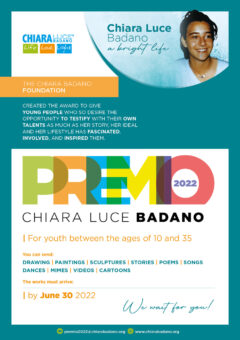
May 17, 2022 | Non categorizzato
A youth competition dedicated to the young girl from Sassello, Italy, beatified in 2010. The jury, headed by Chiara Luce’s mother, Maria Teresa Badano, will vote on artistic submissions in two age categories: 10-16 years and 17-35 years. The award ceremony will be held on 29 October in Sassello.  Applications are open for the Chiara Luce Badano Prize, dedicated to the young girl from Sassello, Italy who was beatified in 2010. The competition invites young people from 10 to 35 years of age, to express through the arts how they have been inspired by encountering Chiara Luce, whose brief life is an example to thousands of young people around the world today. A young woman in love with God. Chiara Luce Badano was 17 when she was diagnosed with a bone tumour, but the infinite love for God was stronger for her. “For you, Jesus. If you want it, I want it too!” She got to know the Focolare Movement while still in primary school, and became one of the Gen (young generation of the Focolare Movement). She didn’t so much speak about Jesus to others, as communicate Him with her life. She used to say, “I don’t need to speak about Jesus, but I must give Jesus through how I behave”. She had received a letter from Focolare founder, Chiara Lubich, proposing, ‘Chiara Luce is the name I thought of for you. Do you like it? It is the light of the Ideal that conquers the world…’ Chiara Luce left this earth on 7 October 1990, at the age of 19, with these last words, “Be happy, Mamma, because I am”, the culmination of suffering lived in the radiant light of faith. In 2018 the Chiara Badano Foundation unveiled the “Chiara Luce Badano Prize”, to promote artistic works inspired by the life and existential model of Chiara Luce, in order to sustain and spread awareness of who she is and her story, and propose her as a model of life for many other young people. Young artists can express all their creativity through visual arts, poetry, story-telling, songs, dance and other forms. All entries must reach the jury by 30 June, as indicated by the rules and directions contained in the prize regulations. The highly qualified jury members, headed by mamma Maria Teresa Badano, will vote on two age categories: 10-16 years and 17-35 years. The 2022 prize will be awarded on 29 October in Sassello during the annual liturgical celebration, when the winning artistic work will be displayed or performed. Full information on the Prize is available on the Chiara Badano Foundation website, where you can also find details of the life of Chiara Luce, known around the world, through video, witness testimonies and photographs. There is a detailed list of the ever growing number of publications covering her life and the Ideal of Chiara Lubich which Blessed Chiara Luce made her own.
Applications are open for the Chiara Luce Badano Prize, dedicated to the young girl from Sassello, Italy who was beatified in 2010. The competition invites young people from 10 to 35 years of age, to express through the arts how they have been inspired by encountering Chiara Luce, whose brief life is an example to thousands of young people around the world today. A young woman in love with God. Chiara Luce Badano was 17 when she was diagnosed with a bone tumour, but the infinite love for God was stronger for her. “For you, Jesus. If you want it, I want it too!” She got to know the Focolare Movement while still in primary school, and became one of the Gen (young generation of the Focolare Movement). She didn’t so much speak about Jesus to others, as communicate Him with her life. She used to say, “I don’t need to speak about Jesus, but I must give Jesus through how I behave”. She had received a letter from Focolare founder, Chiara Lubich, proposing, ‘Chiara Luce is the name I thought of for you. Do you like it? It is the light of the Ideal that conquers the world…’ Chiara Luce left this earth on 7 October 1990, at the age of 19, with these last words, “Be happy, Mamma, because I am”, the culmination of suffering lived in the radiant light of faith. In 2018 the Chiara Badano Foundation unveiled the “Chiara Luce Badano Prize”, to promote artistic works inspired by the life and existential model of Chiara Luce, in order to sustain and spread awareness of who she is and her story, and propose her as a model of life for many other young people. Young artists can express all their creativity through visual arts, poetry, story-telling, songs, dance and other forms. All entries must reach the jury by 30 June, as indicated by the rules and directions contained in the prize regulations. The highly qualified jury members, headed by mamma Maria Teresa Badano, will vote on two age categories: 10-16 years and 17-35 years. The 2022 prize will be awarded on 29 October in Sassello during the annual liturgical celebration, when the winning artistic work will be displayed or performed. Full information on the Prize is available on the Chiara Badano Foundation website, where you can also find details of the life of Chiara Luce, known around the world, through video, witness testimonies and photographs. There is a detailed list of the ever growing number of publications covering her life and the Ideal of Chiara Lubich which Blessed Chiara Luce made her own.
Lorenzo Russo
May 16, 2022 | Non categorizzato
The new commandment of Jesus, love of one’s neighbour, is what the Word of Life suggests to us for the month of May 2022. It is a journey in which we can progress every day and where we find the fullness of Jesus’ message. “The whole of the Law is summarized in a single command: Love your neighbour as yourself” (Gal. 5:14 JB) This sentence comes from St Paul the Apostle. It is brief, precise, explicit and truly wonderful. It tells us that love of neighbour must be the basis and constant inspiration of the Christian way of life. For the Apostle, the fulfilment of the Law lies in practicing this command. The Law, in fact, speaks of not committing adultery, not killing, not stealing, not coveting…. And we know that those who love do not do these things. Those who love do not kill or steal, etc. Those who love, however, do not merely avoid evil. They are open to others; they desire good and accomplish it; they give of themselves, going so far as to give their very lives for their neighbour. For this reason, Paul writes that, when we love our neighbour, we are not merely observing a single command because — “the whole of the Law” is summarized in it. … If the whole of the Law is summed up in love of neighbour, the other commandments should be seen as means to enlighten and guide us in finding the way to love others in the often complex situations of life. We become aware of God’s purpose in giving us the other commandments, of his will as expressed in. them. He wants us to be obedient, chaste, mortified in our passions, meek, merciful, poor and so on, in order to better fulfil the commandment of love.
Chiara Lubich
(Chiara Lubich, in Parole di Vita, Città Nuova, 2017, pp. 263/4)
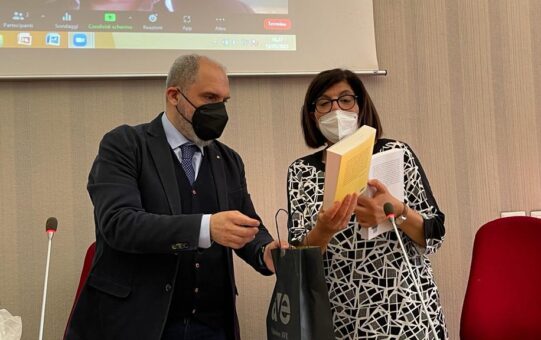
May 14, 2022 | Non categorizzato
Catholic Action and Focolare Movement get together, starting from local Churches, in education and for integral ecology. To “live” the present and the future of our neighbourhoods together and in a practical way. A partnership agreement was made between the Italian Catholic Action (CA) and the Focolare Movement (FM). An alliance that, as Giuseppe Notarstefano, National President of CA underlined, combines the foundational value of a partnership that will become ever more concrete through the importance of appreciating one another, of acting together. The third meeting between the Presidency of the Italian Catholic Action and that of the Focolare Movement took place on Friday, 13th May in Rome, at the National CA Centre in Via Aurelia. Recalling the words spoken by Chiara Lubich, founder of the Focolare, during the bombings of Trent during the Second World War, “Love conquers everything”, Margaret Karram, President of the Focolare Movement, underlined the mutual desire of a partnership that, believing in this certainty, is able to realize the projects and dreams of the two organizations, to be ever more and together, a gift for the Church.  Following two hours of prayer, getting to know one another, discussion and dialogue, it was decided that the FM and CA would initiate and consolidate projects at a local level in various places, starting from the dialogue that comes from life, to restore strength and momentum together with local communities and work in a partnership that is increasingly concrete and intergenerational, which promotes kindness, tenderness, as a way of being and being together, as desired by Pope Francis in the encyclical All Brothers (Tutti Fratelli). Three themes were chosen: 1) the Global Educational Pact; 2) Civil Economy, Political Commitment and Integral Ecology; 3) Ecumenism and Interreligious Dialogue. President Notarstefano expressed the desire to concretely “live” together in the various places, ensuring presence and passion in the networks of dialogue in the local Churches, encouraging and supporting each other to live this path of concreteness, patience and dedication. It is important that, in the current scenario of general disorientation, places of fraternity are created at grassroots level, which, in the storm of what is happening around us, become boats to which people can cling. We wish to testify that working together is possible, in order to generate fraternity, also through a joint, national symbolic initiative that gives value to those who strive to build a greater “we”, in education, for integral ecology, to participate together, also in politics, in a generative path open to other realities, which is an investment in the service of future generations, for the promotion of the person. Margaret Karram, President of the Focolare, said that the commitment to come together in different cities, will bring out the many different concrete actions that can be carried out in the local Churches. To this end, a working group was set up, which will be coordinated by Michele Tridente (CA) and Patrizia Bertoncello (FM), to evaluate the proposals that emerged from Friday’s meeting and consider possible ways to collaborate, through which the two organizations will be open to other realities, to contribute to growth in the various areas and local communities.
Following two hours of prayer, getting to know one another, discussion and dialogue, it was decided that the FM and CA would initiate and consolidate projects at a local level in various places, starting from the dialogue that comes from life, to restore strength and momentum together with local communities and work in a partnership that is increasingly concrete and intergenerational, which promotes kindness, tenderness, as a way of being and being together, as desired by Pope Francis in the encyclical All Brothers (Tutti Fratelli). Three themes were chosen: 1) the Global Educational Pact; 2) Civil Economy, Political Commitment and Integral Ecology; 3) Ecumenism and Interreligious Dialogue. President Notarstefano expressed the desire to concretely “live” together in the various places, ensuring presence and passion in the networks of dialogue in the local Churches, encouraging and supporting each other to live this path of concreteness, patience and dedication. It is important that, in the current scenario of general disorientation, places of fraternity are created at grassroots level, which, in the storm of what is happening around us, become boats to which people can cling. We wish to testify that working together is possible, in order to generate fraternity, also through a joint, national symbolic initiative that gives value to those who strive to build a greater “we”, in education, for integral ecology, to participate together, also in politics, in a generative path open to other realities, which is an investment in the service of future generations, for the promotion of the person. Margaret Karram, President of the Focolare, said that the commitment to come together in different cities, will bring out the many different concrete actions that can be carried out in the local Churches. To this end, a working group was set up, which will be coordinated by Michele Tridente (CA) and Patrizia Bertoncello (FM), to evaluate the proposals that emerged from Friday’s meeting and consider possible ways to collaborate, through which the two organizations will be open to other realities, to contribute to growth in the various areas and local communities.
Sara Fornaro
May 13, 2022 | Non categorizzato
To participate in a film competition and then use the cash prize to help others. With United World Week (SMU) 2022 just days away, we share an experience that comes straight from Jordan. A true action of integral ecology carried out by the teens of the Focolare in the wake of the #DARETOCARE campaign. “I would like to invite you to embark, together, on a journey. A journey of transformation and action. Made up not so much of words, but above all, of concrete and urgent action. (…) Integral ecology is an invitation to an ‘integral’ vision of life, starting from the conviction that everything in the world is connected (…)”. With these words, Pope Francis addresses, through a video message, the participants of the “Countdown” TED’s digital event on climate change, held in October 2020. An invitation to “act” concretely, for the good of the planet and all of us: to care for the common home and meet the needs of its inhabitants. It’s enough to start with small actions, as these Gen 3 from Jordan did, who, with a keen eye on #DARETOCARE, really succeeded in creating a ‘virtuous’ circle by presenting their short film on ecology ‘Nature Karma’ at the Middle Eastern Film Festival. Talking about the importance of caring for the environment and winning an award was just the first step in deciding, with conviction, to want to help others.
Edited by Maria Grazia Berretta
https://youtu.be/7iQylkfn4kk
May 10, 2022 | Non categorizzato
The new commandment calls us to make space within ourselves for the power of Jesus’ boundless love and to allow its wonderful sound to echo forth. It means understanding just how precious is the immense love that we have received without merit and ensuring that it circulates among others. A successful approach We have been married for less than fourteen years and never had any real crisis. Both of us have Christian backgrounds; nevertheless, we are aware that conjugal love can be very fragile. The greatest challenge is bringing up children and this can lead to disagreements. For example, when it comes to disciplining them, I would be more lenient than Pavel. Sometimes I defend them irrationally. In this situation, I am helped by thinking that my husband also wants what is best for them and I try to respect what he feels is his duty as a father (It is also true to say that I often realise that he is right). I pray when I don’t know what to do. We also try to implement the words recommended by Pope Francis: “Please, thank you, I am sorry”, and “may the sun not set on your anger”. From my own experience, I think it is important to respect the time the other person may take to deal with a difficult situation. At such times, I try to express my love with a kiss or a caress. Marriage truly teaches us to relate to the other person . We have seen how “successful” it is to praise our husband or wife – even for the smallest things. Pavel is a master of this approach. (K.S. – Czech Republic) The guest Since the beginning of the pandemic, our community has made a point of keeping in touch with all the members of the group to make sure everyone was well, especially the people who were alone. When one of them who was normally very active fell and broke her right arm, my husband and I offered her hospitality for a while. She accepted. In the meantime, in view of the end-of-year festivities, new, more restrictive health regulations were being imposed, and since our guest would be isolated for Christmas and New Year, we suggested that she extend her stay with us. Impressed by the true family spirit of our community, she attributed it to the implementation of Jesus’ precept: “What you did for one of the least of these brothers, you did for me”. When she was physically more independent and returned to her home, she was aware that the Gospel could become a foundation for life and she immediately started to help those who might be in need. (Constance – Canada) “That” violin When I was twelve, my parents’ marriage ended, but for another ten years we continued to live in the same flat: my mother and I lived in one room and my father in the other. The rest of the flat was shared by us all. The divorce drama made me insecure and fearful. Having sided with my mother, I had to give my father back the violin I was using for practice. When I grew up, I wanted to introduce him to my fiancé but he did not want to see him. He did not come to our wedding and did not even want to meet the two grandchildren when they were born. However, we did not give up and, in order to live our Christian faith consistently, we tried to forget old wounds and we continued to write to him and invite him to our home. Finally, one day he came to meet his son-in-law and grandchildren. Feeling loved, he gradually began to stay longer and longer and bring gifts to the children. When he heard that one of them was learning to play the violin, he brought “that” violin back. (S. – Hungary)
Edited by Maria Grazia Berretta
(excerrpts from Il Vangelo del Giorno, Città Nuova, year VIII, no.2, May – June 2022)
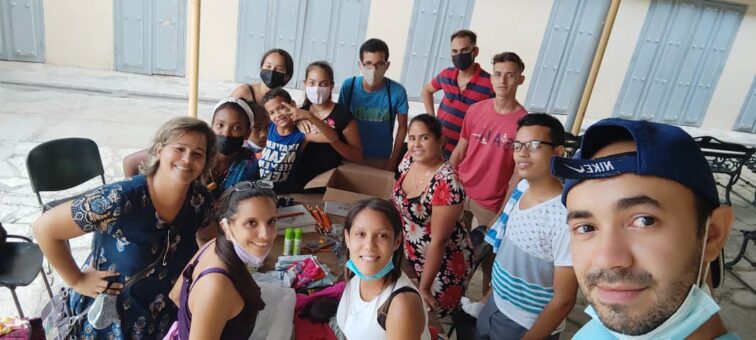
May 9, 2022 | Non categorizzato
This year too, the United World Week (UWW) gave space to global events and actions for peace and fraternity that focused on “Caring”, with a particular focus on integral ecology. The #Daretocare Campaign will continue for another year.
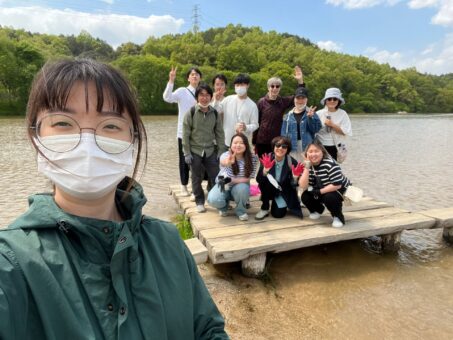
Korea – © UWP
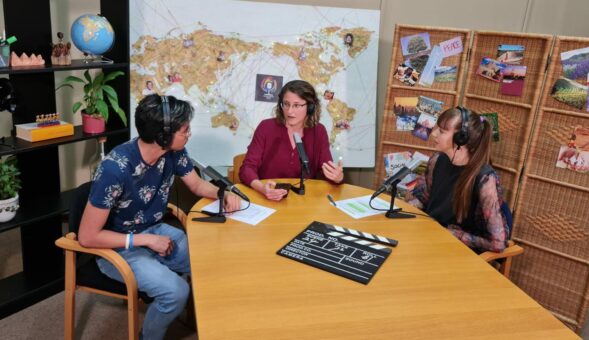
United World Week Podcast – © UWP

Cuba – © UWP
Paolo Balduzzi
May 9, 2022 | Non categorizzato
In his first letter, St John states: Anyone who does not love their brother or sister who they see, cannot love God who they don’t see.(1Jn.4,20) In this extract, Chiara Lubich reflects on how love for each neighbour, brother or sister whom we meet is an obligatory passage for going to God, for feeling union with him. There is a system which is typically ours so we can be sure that we are walking on a right path that will certainly take us to our goal which is God. It has an obligatory passage, and this is called our brother or sister. Let’s throw ourselves into loving every brother or sister we meet during the day. Let’s set alight in our hearts the ardent and praiseworthy desire that God surely wants. It’s the desire to love every neighbour, making ourselves one with him or her in everything, with a disinterested love and without imposing limits. (…) Love will give new life to relationships and to people, and it will prevent us from being selfish. In fact, love will be the best antidote. (…) In this way we will be able to prepare a gift for Jesus. This will be abundant fruit and our heart that is filled with fire and consumed with love. The motto then that will help to remind us of this decision could be: to God through my brother or sister!
Chiara Lubich
(Chiara Lubich, Conversazioni, Città Nuova, 2019, pag. 100)
May 3, 2022 | Non categorizzato
The Focolare Movement’s Emergency Coordination continues to raise funds for Ukraine. Father Vyacheslav Hrynevych, executive director of Caritas Spes Ukraine sent us this short video with a thank you directly from one of the distribution centres. https://youtu.be/co7-47VjQ74 For those who would like to contribute Azione per un Mondo Unito ONLUS (AMU) IBAN: IT 58 S 05018 03200 000011204344 presso Banca Popolare Etica Codice SWIFT/BIC: ETICIT22XXX Azione per Famiglie Nuove ONLUS (AFN) IBAN: IT 92 J 05018 03200 000016978561 presso Banca Popolare Etica Codice SWIFT/BIC: ETICIT22XXX Causale: Emergenza Ucraina
May 2, 2022 | Non categorizzato
The word of life for May 2022 suggests that we put into practice the new commandment of Jesus: mutual love. By looking beyond differences- which are so emphasized in the present time- we can give life to real communities that reveal the great novelty of the Gospel You know that Jesus is present, for example, in the sacraments. In the Eucharist, for instance, he becomes truly present. Jesus is also there wherever mutual love is lived. He said: ‘Where two or three are gathered in my name’ (and this is possible through reciprocal love) ‘I am there among them.’[1] And also in a community where life is deeply rooted in mutual love, he can continue to be actively present. And through the community, he can continue to reveal himself to the world and influence the world. Isn’t this wonderful? Doesn’t it make you want to start right now to live this love with your fellow Christians? According to Saint John,(…) mutual love is the foremost commandment of the Church, whose vocation is, in fact, to be communion, fellowship, to be unity. (…) If, therefore, you want to find the true mark of the authentic disciples of Christ; if you want to know their distinctive characteristic, you will find it in the mutual love they live. Christians are recognized by this sign. If it is missing, the world will no longer be able to find Jesus in the Church. Reciprocal love creates unity. But, what does unity achieve? ‘That they may all be one’ – Jesus continues – ‘so that the world may believe…’[2] Unity, by revealing the presence of Christ, draws the world to follow him. When people see mutual love and unity being lived, they believe in him.
Chiara Lubich
Chiara Lubich, in “Parole di Vita”, [Words of Life] Citta Nuova, 2017, pages 171/2 [1] Mt 18:20. [2] Jn 17:21.
Apr 30, 2022 | Non categorizzato
On 30th April 1982, 7,000 priests, religious and seminarians from all over the world, united by the spirituality of unity, gathered in Rome for the event “The Priest Today, the Religious Today”. Forty years later we look back at that day. Priests who feel called to be first and foremost witnesses of the Gospel and men of dialogue; religious who have found in the spirituality of the Focolare Movement an incentive to embody more fully the charism of their founders; seminarians who have understood that they want to choose God and to confirm their own calling. These are the experiences of many of the participants at the International Congress entitled “The Priest Today, the Religious Today”, held on 30th April 1982 in the Nervi Hall, in the Vatican. 7,000 people took part in that Congress. Through testimonies from all over the globe, they highlighted the fruits of the encounter of the charism of unity with ministers of the Catholic Church and other Churches and the renewal brought to many religious communities. In her speech that day, Chiara Lubich stressed the two focal points of this experience: Jesus crucified and forsaken as the model of the priest and the religious; mutual love and unity as the style and purpose of their mission. To be men of “dialogue”. This is the mandate that, even then, contained the desire of an outgoing Church, as can be seen from the words of the foundress of the Focolare, more relevant than ever today: “Never as in today’s times, is the Church called to look beyond herself to all Christians, to those who have different beliefs or who do not believe at all. Never before is it so evident that what some call “the missionary mandate of the Fourth Gospel” comes to the fore. John expresses it in these terms: ‘By this everyone will know that you are my disciples, if you love one another’. (…) Today Christians are called to evangelize in this way too: loving one another and offering the experience of their new life to others. This cannot fail to touch, to amaze and to provoke questions. And hence dialogue flourishes”. On that day the then Holy Father, John Paul II, presided over “the greatest concelebration since the institution of the Eucharist,” as the Roman Observer called it. It was a moment of joy and sharing, an opportunity to take stock, a starting point for new developments. Today, 40 years later, let’s hear the story of some of the participants.
Edited by Maria Grazia Berretta
https://youtu.be/4Y-PNuJGN4A
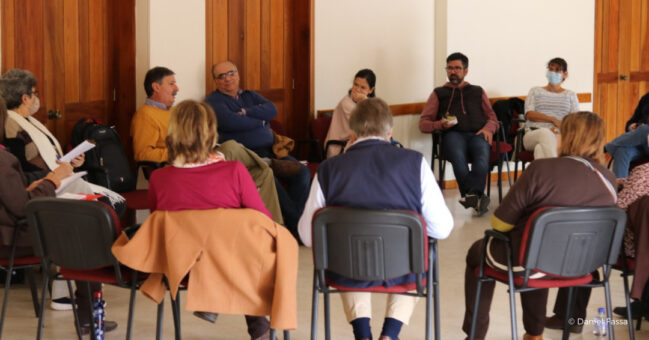
Apr 28, 2022 | Non categorizzato
Expanding horizons of learning. From 27 March to 2 April in Colombia a meeting on “University, knowledge and wisdom: a perspective for Latin America”. A seat in Latin America for Sophia UI. Openness and graduality. These were the guiding principles of the meeting “University, knowledge and wisdom: a perspective for Latin America”, held at Tocancipá, Colombia from March 27 to April 2. It brought together Giuseppe Argiolas, Rector of the Sophia University Institute, with the members of a multi-disciplinary intercultural commission which over the past ten years has been working to build the foundations for a Latin American seat of the university. The General Council of the international Focolare Movement was represented by Francisco Canzani and Renata Simon. 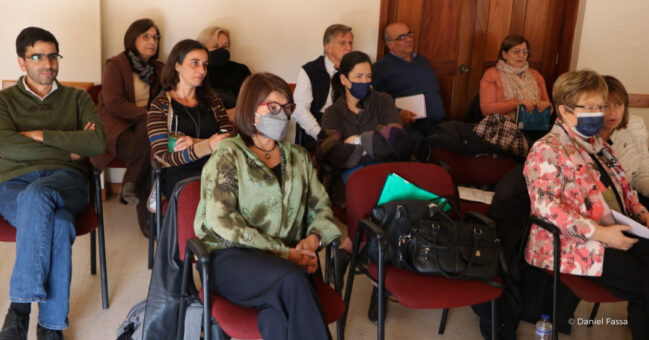 At the heart of their considerations were the guidelines from the Congregation for Catholic Education for the development of a project unprecedented in the history of pontifical universitities. Namely, that the individual units of the Sophia University Institute, even if situated in different continents, can be considered part of a single global university, with its headquarters based at Loppiano, near Florence, Italy. If approved, the Sophia ALC (Latin America and Caribbean) project will be the first step in the formation of this “university network”, with three geographical branches. In Argentina a proposed Master in “Integral Ecology and Interculturalism” delivered in hybrid modality (in person and online); in Brazil a degree course in “Education directed towards Integral Human Development”; in Mexico university extension courses, available mainly online.
At the heart of their considerations were the guidelines from the Congregation for Catholic Education for the development of a project unprecedented in the history of pontifical universitities. Namely, that the individual units of the Sophia University Institute, even if situated in different continents, can be considered part of a single global university, with its headquarters based at Loppiano, near Florence, Italy. If approved, the Sophia ALC (Latin America and Caribbean) project will be the first step in the formation of this “university network”, with three geographical branches. In Argentina a proposed Master in “Integral Ecology and Interculturalism” delivered in hybrid modality (in person and online); in Brazil a degree course in “Education directed towards Integral Human Development”; in Mexico university extension courses, available mainly online.  Over the six day meeting, the commission members concentrated on forming strategies for the gradual implementation of this complex project in all its aspects, including conforming to ecclesial norms as well as to local legislation, economic sustainability, fundraising and publicity, infrastructure and curriculum development. The result was a growing certainty that the moment has arrived to extend even further the horizons of “unity in diversity” experienced by the Sophia ALC team members, who come from Argentina, Brazil, Colombia, Costa Rica, Mexico and Uruguay, and from academic disciplines as diverse as administration, communications, economics, education, history, law, philosophy, sociology and theology. It is clear that the future of the project will depend on a continuing and deepening dialogue between the rector and academic staff of Sophia, the Focolare Movement leadership team, and above all with the Congregation for Catholic Education to indicate the channels along which this dream of Chiara Lubich can be gradually brought to fruition, in this case in the Latin American continent.
Over the six day meeting, the commission members concentrated on forming strategies for the gradual implementation of this complex project in all its aspects, including conforming to ecclesial norms as well as to local legislation, economic sustainability, fundraising and publicity, infrastructure and curriculum development. The result was a growing certainty that the moment has arrived to extend even further the horizons of “unity in diversity” experienced by the Sophia ALC team members, who come from Argentina, Brazil, Colombia, Costa Rica, Mexico and Uruguay, and from academic disciplines as diverse as administration, communications, economics, education, history, law, philosophy, sociology and theology. It is clear that the future of the project will depend on a continuing and deepening dialogue between the rector and academic staff of Sophia, the Focolare Movement leadership team, and above all with the Congregation for Catholic Education to indicate the channels along which this dream of Chiara Lubich can be gradually brought to fruition, in this case in the Latin American continent.
Daniel Fassa

Apr 27, 2022 | Non categorizzato
The “dare to care” theme will once again be the focus of this year’s United World Week on May 1–8, 2022. It’s an opportunity not to be missed throughout the regions. 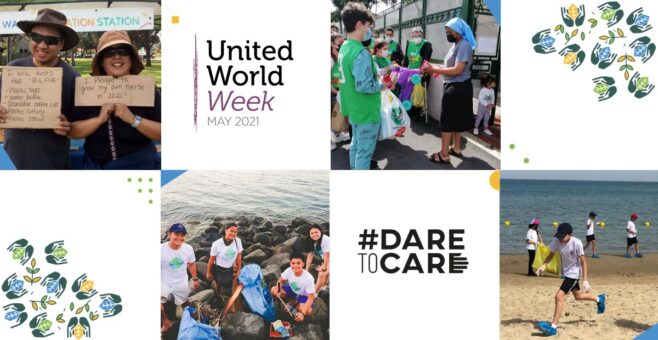 It’s time! We are a few days away from the United World Week 2022, which this year will see thousands of people of all ages, races and creeds involved all over the world. When thinking about this event, typically what comes to mind immediately are young people, large gatherings or events. Yet United World Week is much, much more, because it is not just about young people. Throughout the year there is a wealth of life, with all the different generations of the Focolare Movement and others who work together for universal brotherhood.
It’s time! We are a few days away from the United World Week 2022, which this year will see thousands of people of all ages, races and creeds involved all over the world. When thinking about this event, typically what comes to mind immediately are young people, large gatherings or events. Yet United World Week is much, much more, because it is not just about young people. Throughout the year there is a wealth of life, with all the different generations of the Focolare Movement and others who work together for universal brotherhood. 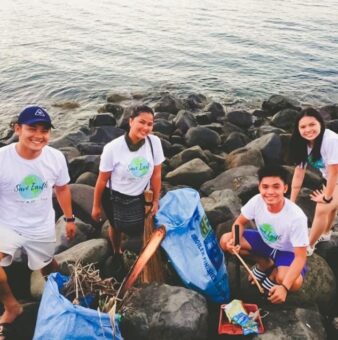 Almost 27 years ago, the Youth for a United World proposed to dedicate one week a year to engage public opinion more actively in the journey towards a united world. I remember the comments, in those days of May in 1995 during the Genfest, trying to figure out what that idea was, what we could do in the year that followed. The answer came in the following weeks and, as always, it came from life itself. The invitation was, and still is, quite specific. The 25 years of history, from the first United World Week in 1996 to the most recent one in 2021, have confirmed this. The first thing to do is to deepen and keep up all the activities that the Focolare communities carry out with courage, and in some cases even silently, to support the journey towards unity in the most diverse contexts. This includes in neighbourhoods, schools, workplaces – situations of fragility and neglect.
Almost 27 years ago, the Youth for a United World proposed to dedicate one week a year to engage public opinion more actively in the journey towards a united world. I remember the comments, in those days of May in 1995 during the Genfest, trying to figure out what that idea was, what we could do in the year that followed. The answer came in the following weeks and, as always, it came from life itself. The invitation was, and still is, quite specific. The 25 years of history, from the first United World Week in 1996 to the most recent one in 2021, have confirmed this. The first thing to do is to deepen and keep up all the activities that the Focolare communities carry out with courage, and in some cases even silently, to support the journey towards unity in the most diverse contexts. This includes in neighbourhoods, schools, workplaces – situations of fragility and neglect. 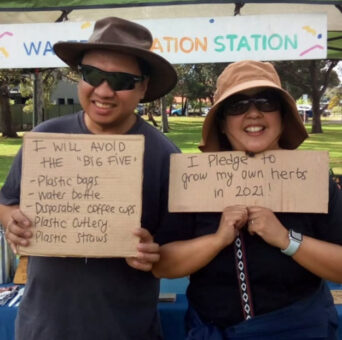 The campaign targets cities, institutions and the media to promote unity and peace at every level, together with all people who are inspired by the same principles and objectives. It is not just young people, but together with those who are older, with the involvement of families, professionals, committed adults, politicians… united by the values of universal brotherhood. Together, by being inclusive, with wide-ranging actions that change and improve the social fabric, we can have a greater impact on world opinion. David Sassoli (1956–2022), the recently deceased former president of the European Parliament, had this to say to Youth for a United World at last year’s United World Week: “I believe that this is a work of civil education that in some way should concern us. It concerns us politicians and institutions, but also of course all the important world of European association. I believe that you in particular are in a privileged position, because you have already defined not only that it is important to take care of others, but also to take care in order to improve the living conditions of others.”
The campaign targets cities, institutions and the media to promote unity and peace at every level, together with all people who are inspired by the same principles and objectives. It is not just young people, but together with those who are older, with the involvement of families, professionals, committed adults, politicians… united by the values of universal brotherhood. Together, by being inclusive, with wide-ranging actions that change and improve the social fabric, we can have a greater impact on world opinion. David Sassoli (1956–2022), the recently deceased former president of the European Parliament, had this to say to Youth for a United World at last year’s United World Week: “I believe that this is a work of civil education that in some way should concern us. It concerns us politicians and institutions, but also of course all the important world of European association. I believe that you in particular are in a privileged position, because you have already defined not only that it is important to take care of others, but also to take care in order to improve the living conditions of others.”  This is the care that the world needs. Even in this very special year, on every continent, it has not gone lacking. “Caring for others is an act of courage,” says Jomery Nery, a young Brazilian tax lawyer who is also the director of operations for Anpecom (the Portuguese national association of the Economy of Communion). From Anpecom comes an initiative called Supera (a program for overcoming economic vulnerability). Jomery describes it this way: “Throughout the year we receive messages, emails and other communications from people who need help to eat, to build a house because they live in cardboard housing, for rent, to study or to start a business. Supera is a campaign to collect money, which is then used to help people in need.” It’s a “cure” directed towards fragile situations. In Belfast, too, the capital of Northern Ireland, they have taken this on seriously. For close to four years the city has been hosting an initiative that you could say was both ecological and social, which also takes place in the same way in other parts of the world. It’s called the Repair Café, that is, a bar for repairs, where volunteers are available to fix broken objects that people bring. As they do, they spend a nice morning together. The Repair Café is a real experience, both for the volunteers who fix things and for the people who decide to invest their time and bring an object to be fixed rather than throwing it away. Their motivations behind this are the most diverse, from concern about climate change, to the wish to see a fond object work once more. And with that excuse, relationships and ties are woven, and the strength to face daily challenges is found. In Lecce, Italy, a community made up of families, young people, professionals, artists, together with associations and the parish, works to redevelop a neighbourhood that has become marginalised, difficult and colourless from many points of view. “The first idea was to make the wall of the oratory more joyful and colourful,” says Don Gerardo. “That’s where the idea of the first mural came from, and people truly appreciated it.” Slowly, thanks to word of mouth, and to the young writers present in the area, artists from many parts of the world arrived to beautify the buildings of the Stadio district. With them came photographers, tourists and local administrators who were drawn by the true works of art that these murals represent. Everything is the result of a fraternity that has been created between the artists and the inhabitants of the neighbourhood. It has triggered a virtuous change that everyone feels part of – a true project to help those most in need, which has included activities for economic, environmental and social redevelopment. It is stories like these that give a soul to United World Week. These communities of active people who put themselves on the line will find a showcase from May 1–7, 2022 in many events around the world, both virtual and in person, that will do nothing more than collect and show the life that exists in the various regions. The title once again be #Dare to Care – the same “care” that can still make people repeat what Chiara Lubich said about United World Week in 2002: “It is always something a bit special. It is one of the initiatives that is most in keeping with the charism.”
This is the care that the world needs. Even in this very special year, on every continent, it has not gone lacking. “Caring for others is an act of courage,” says Jomery Nery, a young Brazilian tax lawyer who is also the director of operations for Anpecom (the Portuguese national association of the Economy of Communion). From Anpecom comes an initiative called Supera (a program for overcoming economic vulnerability). Jomery describes it this way: “Throughout the year we receive messages, emails and other communications from people who need help to eat, to build a house because they live in cardboard housing, for rent, to study or to start a business. Supera is a campaign to collect money, which is then used to help people in need.” It’s a “cure” directed towards fragile situations. In Belfast, too, the capital of Northern Ireland, they have taken this on seriously. For close to four years the city has been hosting an initiative that you could say was both ecological and social, which also takes place in the same way in other parts of the world. It’s called the Repair Café, that is, a bar for repairs, where volunteers are available to fix broken objects that people bring. As they do, they spend a nice morning together. The Repair Café is a real experience, both for the volunteers who fix things and for the people who decide to invest their time and bring an object to be fixed rather than throwing it away. Their motivations behind this are the most diverse, from concern about climate change, to the wish to see a fond object work once more. And with that excuse, relationships and ties are woven, and the strength to face daily challenges is found. In Lecce, Italy, a community made up of families, young people, professionals, artists, together with associations and the parish, works to redevelop a neighbourhood that has become marginalised, difficult and colourless from many points of view. “The first idea was to make the wall of the oratory more joyful and colourful,” says Don Gerardo. “That’s where the idea of the first mural came from, and people truly appreciated it.” Slowly, thanks to word of mouth, and to the young writers present in the area, artists from many parts of the world arrived to beautify the buildings of the Stadio district. With them came photographers, tourists and local administrators who were drawn by the true works of art that these murals represent. Everything is the result of a fraternity that has been created between the artists and the inhabitants of the neighbourhood. It has triggered a virtuous change that everyone feels part of – a true project to help those most in need, which has included activities for economic, environmental and social redevelopment. It is stories like these that give a soul to United World Week. These communities of active people who put themselves on the line will find a showcase from May 1–7, 2022 in many events around the world, both virtual and in person, that will do nothing more than collect and show the life that exists in the various regions. The title once again be #Dare to Care – the same “care” that can still make people repeat what Chiara Lubich said about United World Week in 2002: “It is always something a bit special. It is one of the initiatives that is most in keeping with the charism.”
Paolo Balduzzi
Apr 27, 2022 | Non categorizzato
Together for a New Africa (T4NA) is a training course conceived and implemented by young people from several African countries. It aims to teach responsible and participatory government and to equip students to face the key challenges of their continent by promoting and developing a culture of unity. Adelard Kananira told us about this experience of training, tutoring and networking and gave some examples of the results so far. Playing an active role in society and making choices that contribute to the common good of all, right there, where people live. This is the dream of Together for a New Africa, which, involving many young people, intends to rethink a new African leadership, capable of dealing with the multiple challenges of each individual country. Adelard Kananira, a young Burundian, who has lived in Italy for five years and is one of the organizers of the various T4NA Summer Schools, told us about it. After graduating from Sophia University, he works for the Secretariat of the Political Movement for Unity. Adelard, how did T4NA start? Together for a new Africa is a project that was born at Sophia university. And it came from Sophia university African students who thought from the experience they were having, what can they give back to their continent in the light of the culture of unity. They sat together, then they thought they put ideas together and they come up with this project and the first summer school was in 2018 in one of the little towns of the Focolare Movement, Mariapolis Piero which is in Nairobi (Kenya) and is where subsequent meetings also took place. What is the core of this project? Together for a new Africa is a project that was born at Sophia university. And it came from Sophia university African students who thought from the experience they were having, what can they give back to their continent. Initially we did not have a lot of resources and since Africa is very big and presents thousands of faces, we started with some countries of the Eastern Africa, hoping to eventually reach everyone. I remember that during the first Summer Schools, some participants didn’t even want to talk to each other. There were difficulties that led to saying: “We don’t know each other, how can we go ahead?” But surprisingly after spending time together we noticed how, little by little, all the barriers between cultures and tribes disappeared. We have actually witnessed this personal growth, as a group and as one immense continent. What are the results of this project? We can really testify that after three years of summer schools and training courses, there are a lot of results. We have seen some participants go into politics, become activists and leaders and do a lot of things for their communities. They have received many awards and in some countries they have joined hands with other associations to respond to the many emergencies. This not only gives us hope, but shows that the project is growing. And we are proud of it. What are the next steps? Today we concluded our first cycle of 3 years of training course which was amazing. And now we are going to the second cycle, which is going to start at the end of this year. And it will move from seven countries to 14 countries. It’s a challenge. We recognize that, but our dream was and is the whole of Africa. This step ahead is showing us that we can succeed because the young people have taken it on board as their own project and together we can go ahead.
Maria Grazia Berretta
https://www.youtube.com/watch?v=qoNkU2PI5Qo&t=108s
Apr 25, 2022 | Non categorizzato
“Go into all the world and proclaim the good news to the whole creation.” This is the word of life that we are trying to put into practice during April 2022. Chiara Lubich’s words also encourage us to be witnesses of the Gospel. How can we bear witness to Jesus? By living the new life he brought on earth, which is the life of love, and by showing others its fruits. With every neighbour I meet, I have to follow the promptings of the Holy Spirit who helps me to “make myself one” with them and to serve them as perfectly as possible. The Spirit gives me the strength I need to love my neighbours even if, in some way, they are my enemies. It is the Spirit who enriches my heart with mercy, enabling me to forgive and understand their needs. It is the Spirit who makes me zealous in communicating, at the right time, all the beautiful things I most treasure in my soul… The love of Jesus is revealed and passed on to others through my love. It is like a magnifying glass that concentrates the rays of the sun. When you hold a magnifying glass over some straw, the concentration of the sun’s rays causes the temperature to rise and the straw catches fire. If instead we simply put the straw in the sun, it does not catch fire. The same can be true for people. They might seem to be indifferent to religion but sometimes – because this is what God wants – when they are in contact with someone who participates in God’s love, they “catch fire” because that person is like a magnifying glass that concentrates the rays, giving them fire and light. With and through this love of God in our hearts, we can reach further and further, and share our discovery with many other people:
Chiara Lubich
(Chiara Lubich in [Words of Life], Città Nuova, 2017, pages 691/2)
Apr 22, 2022 | Non categorizzato
An empty tomb, a light that illuminates the world and in its trail, we can build bridges of true unity. Heike Vesper, Enno Dijkema and Mervat Kelli, focolarini from different Christian Churches, tell us about Easter. “Easter is the centre of the Christian faith, it is the mystery of Salvation. Without Easter there is no Christianity. Jesus became incarnate to save us. All Christians believe in the same Jesus Christ who died and rose again.” These are the words that Mervat Kelli, an Orthodox focolarina from Syria, used to indicate to us the fertile ground where nothing ends but everything begins; the tangible space where we can meet, share and be enveloped by the light of the Resurrection. This is the ecumenical meaning of Easter, the inheritance that Christ leaves us. “It’s a time to adore him,” says Enno Dijkema, a Catholic focolarino from Holland. “Jesus,” he continues, “loves us to the point of abandonment to the Father, even unto death. He gives everything! I can safely entrust to him all my miseries, my limitations and everyone’s suffering. There is no darkness that is not overcome by the light of his love.” Heike Vesper, a German focolarina from the Lutheran Church, says that Easter means that Jesus Forsaken “has healed our relationship with the Father. In his cry, in his ‘why’” she says, “I find all my ‘whys’ and my anxieties.” Every resurrection is preceded by a period of waiting, the time to wait as Mary did, under the cross, without knowing what to do. There is the silence and the darkness of Holy Saturday before the dawn of Sunday arrives with the fire, the liturgy of light and the renewal of baptism”. Easter is a time of great communion with one’s brothers and sisters, rooted in an attitude of forgiveness. As Mervat says, “In the Syrian Orthodox Church to which I belong, Easter is called ‘the great feast’. The preparation begins at the beginning of Lent with the consecration of the oil of reconciliation. At the end of the liturgy, each member of the faithful dips a piece of cotton wool in the consecrated oil and goes towards, one by one, to ask for their forgiveness – bringing his or her own and receiving theirs in turn. They draw a small cross on their foreheads and say: ‘I forgive you with all my heart, let this oil be the sign of my forgiveness. I ask you to forgive me.'” The various traditions and the different forms of liturgy represent a great richness, and being able to live them together, as often happens in the Focolare Movement, highlights “the immensity of God Love” as Heike says. She continues, “For some time now, I’ve been living in a community with Catholics, and it is precisely these liturgies that we try to live together if the timetable of the celebrations allows it. So, almost every year on Good Friday we go together first to the Lutheran church and then to the Catholic church. The same thing at Easter.” “For me this is the first Easter in Italy,” says Enno, “but in Holland I have been able to attend the Good Friday service with the Protestant member of my focolare. It was good to do that.” Mervat, who according to the Julian calendar is preparing to celebrate the Orthodox Easter on 24th April this year, has been in Italy for some years now and has the joy of participating in all the services of the Catholic Church with other focolarine. She feels this is a wonderful opportunity: “We still have different dates, but we have the same faith, the same hope, the same Love of God the Father, the Son and the Holy Spirit. We all have the same commandment: love one another as I have loved you. This is the key that opens the door to unity.”
Maria Grazia Berretta
Apr 21, 2022 | Non categorizzato
The Gospel speaks of God’s love. Sowing seeds that carry this proclamation and choosing to live it out is an expression of the beautiful, fruitful freedom we have been given. Condominium meeting When notice of the condominium meeting arrived, my first thought was to find an excuse and avoid this commitment. My youngest son, hearing me complain about these meetings that I thought were useless, objected. “But Dad, it’s an opportunity to make the whole building a family!” I hadn’t thought of that. But how could I turn that meeting into something beautiful and new? With the help of everyone in the house, we came up with a guessing game for the tenants’ names, their number of children, type of work… Then we made a plan to set up visits and dinners, plus a list of birthdays and other celebrations. The more ideas came up, the more I looked forward to the meeting. And it was a real party. My wife had prepared sweets, the children had prepared cards to set up visits, and our daughter, who was good at drawing, had prepared diplomas and prizes for the winners. Never had the condominium meeting seemed so short as that evening. A different air was beginning to circulate in the building. M., Italy Dolls After Dad’s death, thinking that Mom could no longer live alone, the question went around us children: “Will we be forced to put Mom in a nursing home?” My family lives in an apartment that is too small to house her. But my wife and I decided to trust in God’s providence, and with this in mind we rented for Mom the apartment next to ours, which in the meantime had become available. It seemed like a gamble, but the arrival of our kids’ grandmother enriched their lives and ours. She was very good at making fabric dolls and started giving them as gifts to those who had children. Then a person from the parish saw this and appreciated them, setting up a market where she could sell them along with other sewing items. Today, Mom’s home has become a small craft centre and a school for those with free time. We are happy to see her joyful and practically rejuvenated in feeling useful. H., France The wallet I was visiting my mother in the small town where she lives. I don’t know why, but before passing by, I felt the urge to have a cappuccino at the bar. Spotting a wallet on the floor in front of the cashier, I asked the cashier whose it was. She questioned the customers present, but the wallet did not belong to any of them. Upon examining the contents, the owner’s name was an acquaintance of my mother’s, so through her I could get it to him. The cashier knew my mother, so she trusted me with the wallet. Not far from the bar I saw the owner. I greeted him, we exchanged a few words and then I asked him if he had his wallet with him. When he realized he didn’t have it, I showed it to him. When I left him, he couldn’t stop thanking me. Later, thinking back to that sudden urge to stop by the bar, I realized that sometimes, unknowingly, we become instruments for doing good. M., Slovakia
Edited by Maria Grazia Berretta
From “Il Vangelo del Giorno”, Città Nuova, year VIII, n.2, March–April 2022.
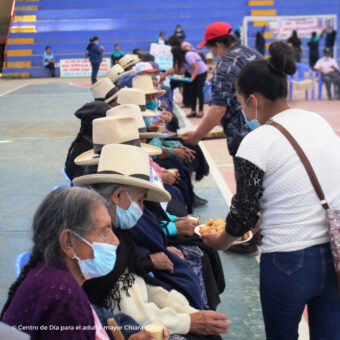
Apr 20, 2022 | Non categorizzato
The “Chiara Lubich” Home for the Elderly in the Peruvian Amazon is celebrating its first anniversary. The centre takes care of about fifty abandoned elderly people. “It is our contribution to peace”, say those who support them. 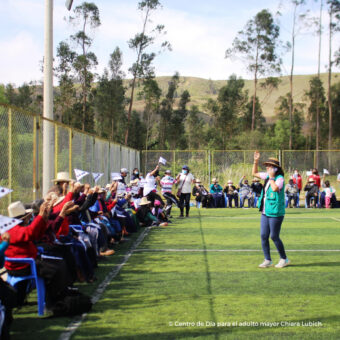 Just when the Covid-19 crisis was at its worst, the “Chiara Lubich Centre for the Elderly” in the Peruvian Amazon jungle opened its doors on 8 March 2021– after many years the great dream had finally become a reality. “Right from the start, everything arrived as a gift with simplicity,” says Jenny López Arévalo, President of the Centre, “the house, the dishes, the ingredients for lunch for almost 50 elderly people, the chairs, tables, mattresses, sheets… To our surprise, each thing arrived and took its place”. The centre is located in Lámud, an Amazonian town in northwest Peru, 2,330 metres above sea level. A few kilometres away is the little town of Kuelap, an important pre-Inca archaeological site from the Chachapoyas culture. “Teamwork was really important. The volunteers really gave their all,” said Jenny López Arévalo, “There were difficulties but we managed to overcome them by concentrating on living well in the present moment. The months flew by and before we knew it we were celebrating our first anniversary. How exciting! We decided to organise a two-day event with a programme open to the public, involving local institutions, the press and social networks. It was a simple way to thank God and everyone.
Just when the Covid-19 crisis was at its worst, the “Chiara Lubich Centre for the Elderly” in the Peruvian Amazon jungle opened its doors on 8 March 2021– after many years the great dream had finally become a reality. “Right from the start, everything arrived as a gift with simplicity,” says Jenny López Arévalo, President of the Centre, “the house, the dishes, the ingredients for lunch for almost 50 elderly people, the chairs, tables, mattresses, sheets… To our surprise, each thing arrived and took its place”. The centre is located in Lámud, an Amazonian town in northwest Peru, 2,330 metres above sea level. A few kilometres away is the little town of Kuelap, an important pre-Inca archaeological site from the Chachapoyas culture. “Teamwork was really important. The volunteers really gave their all,” said Jenny López Arévalo, “There were difficulties but we managed to overcome them by concentrating on living well in the present moment. The months flew by and before we knew it we were celebrating our first anniversary. How exciting! We decided to organise a two-day event with a programme open to the public, involving local institutions, the press and social networks. It was a simple way to thank God and everyone.  On the first day, we planned a walk in nature, outside the city, followed by games and dancing. We shared a delicious coffee with tamales (a corn-bashed dish) and sandwiches. We were surprised and excited to see how many people joined us, besides the volunteers – adults and children – to help look after the elderly. It was lovely to see our logo with Chiara Lubich’s face fluttering in the wind. The next day, we began with the Eucharist which was followed with a town festival full of colours, music and traditional dances, just after the national flag in honour of our country was raised by the elderly people. The day finished with a toast with the local authorities present and more traditional dances!” “Many friends from different parts of the world joined us in prayer,” said Javier Varela who acts as administrator for the Centre, “and much of the food we offered arrived as a gift. The elderly were so happy, they really enjoyed the day and, despite being a little tired, we shared their joy. We feel encouraged and strengthened to continue working to make our contribution to peace by taking care of the abandoned elderly who have already become part of our lives”. So one year on, the “Chiara Lubich Centre for the Elderly” is more than just a “Centre”. It is a real “family” that carries out this delicate and important work for the benefit of the least. It is a simple way of sowing seeds of peace every day right there where we live.
On the first day, we planned a walk in nature, outside the city, followed by games and dancing. We shared a delicious coffee with tamales (a corn-bashed dish) and sandwiches. We were surprised and excited to see how many people joined us, besides the volunteers – adults and children – to help look after the elderly. It was lovely to see our logo with Chiara Lubich’s face fluttering in the wind. The next day, we began with the Eucharist which was followed with a town festival full of colours, music and traditional dances, just after the national flag in honour of our country was raised by the elderly people. The day finished with a toast with the local authorities present and more traditional dances!” “Many friends from different parts of the world joined us in prayer,” said Javier Varela who acts as administrator for the Centre, “and much of the food we offered arrived as a gift. The elderly were so happy, they really enjoyed the day and, despite being a little tired, we shared their joy. We feel encouraged and strengthened to continue working to make our contribution to peace by taking care of the abandoned elderly who have already become part of our lives”. So one year on, the “Chiara Lubich Centre for the Elderly” is more than just a “Centre”. It is a real “family” that carries out this delicate and important work for the benefit of the least. It is a simple way of sowing seeds of peace every day right there where we live.
Gustavo E. Clariá
Apr 18, 2022 | Non categorizzato
Jesus is risen! And he entrusted to us to be witnesses of his living presence among us that would transform society. It’s an invitation to be bearers of the proclamation of the Good News in the environments where we live. Jesus told us that he would be present where two or more are united in his name?[1] Allowing the risen Lord to live in us and in our midst therefore is the secret, the most concrete way to bring about the kingdom of God. It is the kingdom of God in action. … These words are a mandate that Jesus left, not only for his apostles, but for the whole Church and for each one of us. The task of the Church is to witness to the risen Lord, not only by proclaiming him – as his ministers are called to do – but also and above all through the life of each of us who are its members. Witnessing to the Risen Lord means showing the world that Jesus is the living God, and this will be possible if the world sees that Jesus is alive in us. If we live his Word and reject the inclinations of our ‘old self’[2], and if, above all, we keep love for our neighbor alive in our hearts, then the risen Lord will live in us. If we make a special effort to maintain mutual love among us, the risen Lord will live in us and in our midst, and will radiate his light and grace around us, transforming our surroundings and producing incalculable fruits. It will be the risen Lord, through his Spirit, who will guide our steps and our activities. He will be the one who will arrange circumstances and provide us with opportunities to bring his life to those who need him. … We must not underestimate the projects for which we still have to plan, and the technological advances that are offering us new ways to proclaim the Gospel, but there is one thing above all that we must do: we must be his witnesses by allowing the Risen Lord to live in us.
Chiara Lubich
(Chiara Lubich, in [Words of Life], Città Nuova,2017, pages 315/8 [1] See Mt 18:20. [2] See Eph 4:22-24; Col 3:9-10.
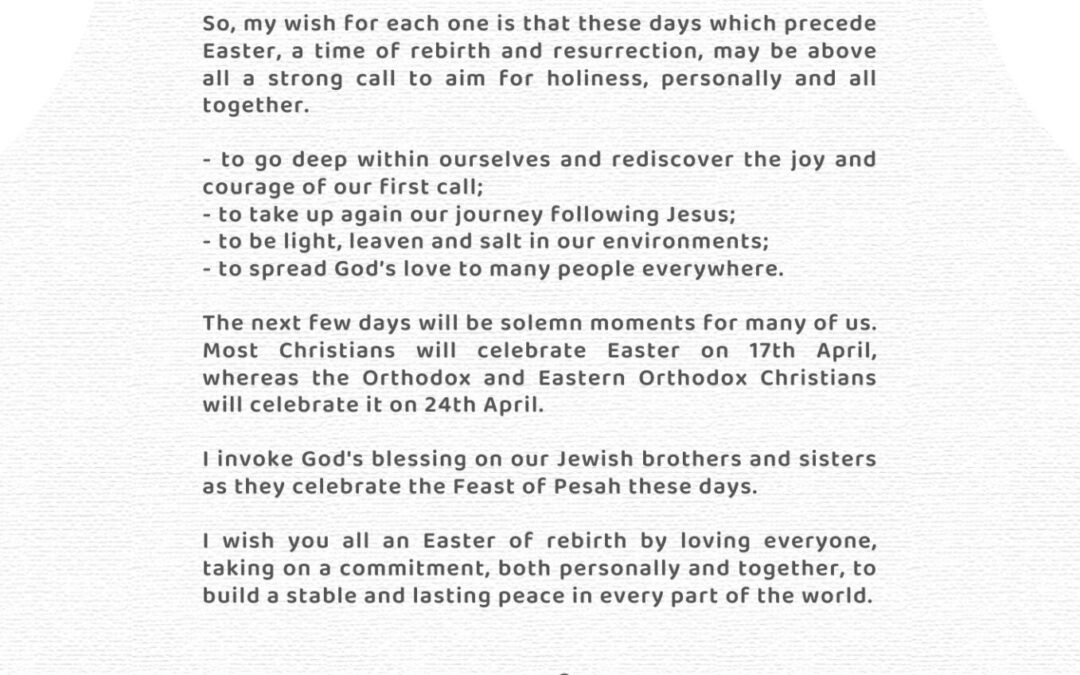
Apr 14, 2022 | Non categorizzato
Easter greetings from Margaret Karram, President of the Focolare Movement https://youtu.be/AYrr6xg1XmI 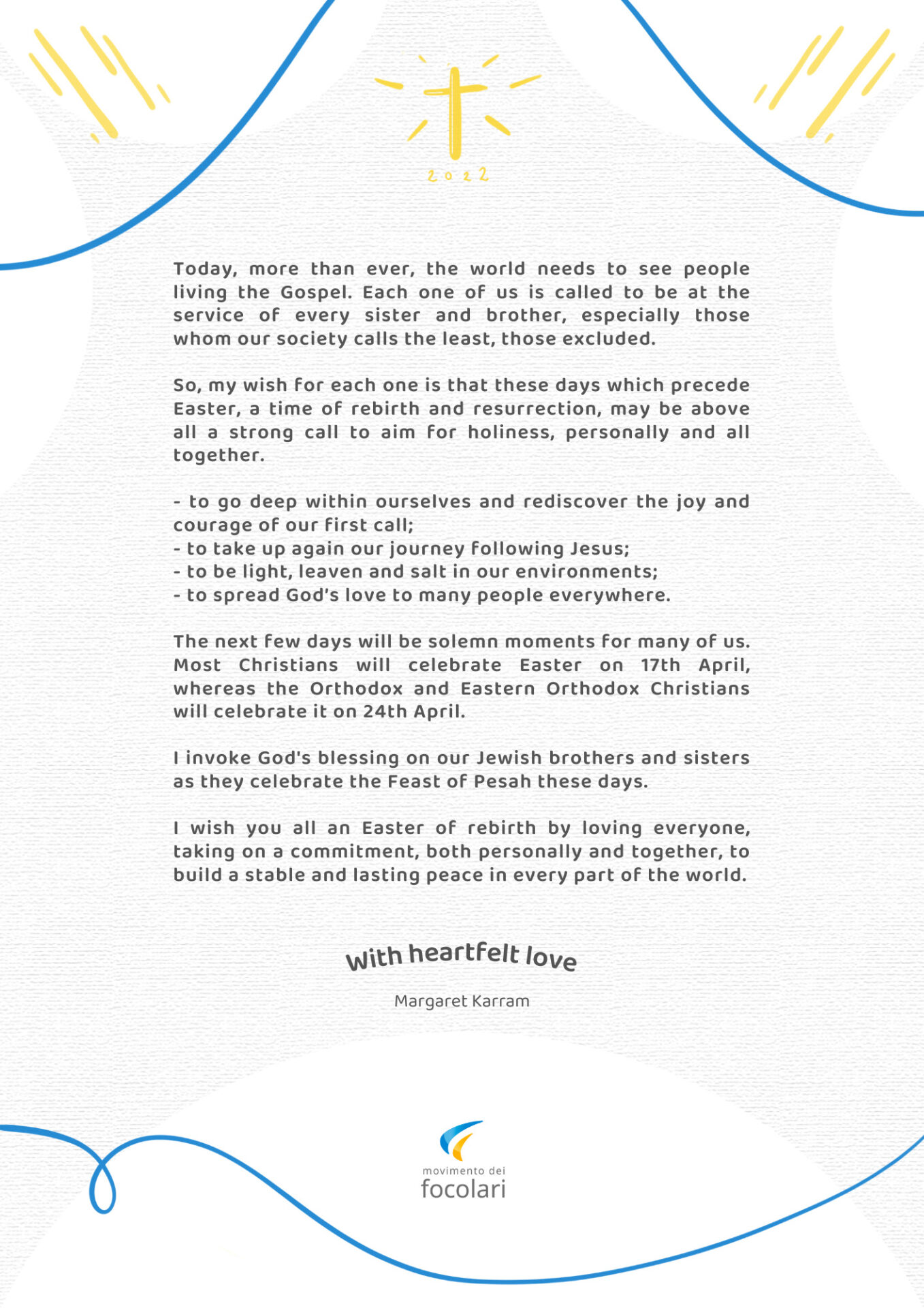
Apr 12, 2022 | Non categorizzato
Since the beginning of the conflict in Ukraine, the Emergency Committee of the Focolare Movement has promoted a fundraising campaign to support the people affected.
In this video, Mira, a Slovenian focolarina who lives in Ukraine and works for Caritas-Spes, tells us what is happening, the actions we are carrying out and the aid we are providing, thanks to the contributions of all of you.
https://youtu.be/qLrk8JR78ms
To contribute to the fund of the Emergency Committee of the Focolare Movement, you can donate to the following:
Azione per un Mondo Unito ONLUS (AMU) IBAN: IT 58 S 05018 03200 000011204344 presso Banca Popolare Etica Codice SWIFT/BIC: ETICIT22XXX
Azione per Famiglie Nuove ONLUS (AFN) IBAN: IT 92 J 05018 03200 000016978561 presso Banca Popolare Etica Codice SWIFT/BIC: ETICIT22XXX
Causes: Emergenza Ucraina
Apr 12, 2022 | Non categorizzato
The Rector of the Pontifical Lateran University (Rome) and professor of International Law, affirms that there is not and cannot be a ‘just’ war. Nothing can justify an armed conflict. Peace is something we must build individually and together. We must keep our hearts open to the whole world; not forget any conflict and act to make our contribution to peace at all levels. https://www.youtube.com/watch?v=jsnUiPDPII8


 You see them handling the red earth of Puglia, in southern Italy, you observe them knead it with straw, you watch them shape the material to create something ecologically sustainable. And you think that what they are doing also has the force of a metaphor. They are aged 13-17 years old. They met in San Vito dei Normanni, in Brindisi, to contribute to the rebirth of an asset confiscated from the mafia gangs. They are mostly children of this land caressed by the sun and at this time of year, invaded by tourists. But they also come from Piedmont and Lombardy, where some people think that the mafia is only something to do with southern Italy. Not these young people. They came down here to Upper Salento to spend part of their holiday in a different way and to make a contribution to change. There are twenty of them, full of the energy and fun-loving, typical of their age. They’re spending 4 days here, protagonists in a project organized for them by Libera and the Focolare Movement.
You see them handling the red earth of Puglia, in southern Italy, you observe them knead it with straw, you watch them shape the material to create something ecologically sustainable. And you think that what they are doing also has the force of a metaphor. They are aged 13-17 years old. They met in San Vito dei Normanni, in Brindisi, to contribute to the rebirth of an asset confiscated from the mafia gangs. They are mostly children of this land caressed by the sun and at this time of year, invaded by tourists. But they also come from Piedmont and Lombardy, where some people think that the mafia is only something to do with southern Italy. Not these young people. They came down here to Upper Salento to spend part of their holiday in a different way and to make a contribution to change. There are twenty of them, full of the energy and fun-loving, typical of their age. They’re spending 4 days here, protagonists in a project organized for them by Libera and the Focolare Movement.  For a few hours a day, they work in the fields of social cooperatives that manage 50 hectares of olive groves and other structures taken from the “bosses”. And in their genuine commitment, you can perceive a desire to get their hands dirty, to roll up their sleeves, to actively bring something new, even in a land marked by the arrogance of the mafia. “This is our land, given back to the community”, they seem to say, as they work with clay, sand and silts to build wooden structures designed for a society in which everything can be circular. To guide them, the young people of the “Ex Fadda” urban laboratory and the “XFarm” project, a handful of enthusiasts of civil economy, active citizenship, and good practices in agriculture who after various experiences around the world found themselves here, in the land where the United Sacred Crown once ruled, to experience a new model of coexistence, to try to realize the dream of communities actively involved in regenerative processes.
For a few hours a day, they work in the fields of social cooperatives that manage 50 hectares of olive groves and other structures taken from the “bosses”. And in their genuine commitment, you can perceive a desire to get their hands dirty, to roll up their sleeves, to actively bring something new, even in a land marked by the arrogance of the mafia. “This is our land, given back to the community”, they seem to say, as they work with clay, sand and silts to build wooden structures designed for a society in which everything can be circular. To guide them, the young people of the “Ex Fadda” urban laboratory and the “XFarm” project, a handful of enthusiasts of civil economy, active citizenship, and good practices in agriculture who after various experiences around the world found themselves here, in the land where the United Sacred Crown once ruled, to experience a new model of coexistence, to try to realize the dream of communities actively involved in regenerative processes. 
 A moment of celebration and sharing to be embraced by the Church, “family of families” (Al 87) and to feel an integral part of this people on a journey. From 22 to 26 June 2022 Rome will host the
A moment of celebration and sharing to be embraced by the Church, “family of families” (Al 87) and to feel an integral part of this people on a journey. From 22 to 26 June 2022 Rome will host the 


 In fact, on 3 June 2022 in Stockholm, acting on behalf of all its communities, the Focolare Movement was able to present its own document – Focolare EcoPlan – which demonstrates its commitment to the environment. The presentation of EcoPlan was motivated by the spirituality that has given life to the Movement. It was officially handed over to Iyad Abu Moghli from Jordan, UNEP Senior Principal Advisor and director of the Faith for Earth Initiative, who said that the EcoPlan is “an ambitious and comprehensive ecological approach.”
In fact, on 3 June 2022 in Stockholm, acting on behalf of all its communities, the Focolare Movement was able to present its own document – Focolare EcoPlan – which demonstrates its commitment to the environment. The presentation of EcoPlan was motivated by the spirituality that has given life to the Movement. It was officially handed over to Iyad Abu Moghli from Jordan, UNEP Senior Principal Advisor and director of the Faith for Earth Initiative, who said that the EcoPlan is “an ambitious and comprehensive ecological approach.” 
 Yes, it was January 2019 and a delegation from the Sophia University Institute (IUS) visited the Ecumenical Patriarch Bartholomew in the Phanar, the historic Greek quarter of present-day Istanbul (Turkey). We were also welcomed very warmly by Metropolitan Elpidophoros of Bursa, then Abbot of the Monastery of the Holy Trinity on the island of Halki and Professor of the Theological School of the University of Thessaloniki (he became Archbishop of America the following May). We experienced a deep communion with him which gave rise to the desire to organize together a Summer School in Halki with Catholic and Orthodox students and teachers, on the theme of ecology, so dear to both the sister Churches of Rome and Constantinople. The pandemic delayed it but today that dream has come true.
Yes, it was January 2019 and a delegation from the Sophia University Institute (IUS) visited the Ecumenical Patriarch Bartholomew in the Phanar, the historic Greek quarter of present-day Istanbul (Turkey). We were also welcomed very warmly by Metropolitan Elpidophoros of Bursa, then Abbot of the Monastery of the Holy Trinity on the island of Halki and Professor of the Theological School of the University of Thessaloniki (he became Archbishop of America the following May). We experienced a deep communion with him which gave rise to the desire to organize together a Summer School in Halki with Catholic and Orthodox students and teachers, on the theme of ecology, so dear to both the sister Churches of Rome and Constantinople. The pandemic delayed it but today that dream has come true.  It is 6.30 pm on Wednesday, 8th June, 2022 and we are once again in the “queen of cities”, as the beautiful city of Constantinople was called, with good reason. Patriarch Bartholomew gave a passionate and informative greeting to participants, students and teachers from all continents and with very varied interdisciplinary and ecumenical experiences. The audience included Msgr. Marek Solczynski, the new Apostolic Nuncio to Turkey, Msgr. Vincenzo Zani, Secretary of the Congregation for Catholic Education, Archbishop Elpidophoros and Margaret Karram, President of the Focolare Movement and Vice-Chancellor of the IUS. “Everything is in a relationship of love” said Margaret Karram, recalling the destiny of unity embedded in the universe, that today more than ever, man and woman are called to promote with bold, prophetic action and thought. The title of the fifth Halki Summit organized jointly by the Patriarchate of Constantinople and the IUS, which began on Wednesday, 8th June, is a clear indication of this: “Sustaining the future of the planet together”. It is no coincidence that Patriarch Bartholomew emphasized two words from this title: “future” and “together”. The first refers to the strong intergenerational bond inherent in respect for the environment in which we live; the second to the mandatory interdisciplinary approach to be taken in the face of the vastness and complexity of ecological problems. He said, “It becomes evident that only a cooperative and collective response by religious leaders, scientists, political authorities, educational institutions and financial organizations will be able to effectively address these imperative issues of our time”.
It is 6.30 pm on Wednesday, 8th June, 2022 and we are once again in the “queen of cities”, as the beautiful city of Constantinople was called, with good reason. Patriarch Bartholomew gave a passionate and informative greeting to participants, students and teachers from all continents and with very varied interdisciplinary and ecumenical experiences. The audience included Msgr. Marek Solczynski, the new Apostolic Nuncio to Turkey, Msgr. Vincenzo Zani, Secretary of the Congregation for Catholic Education, Archbishop Elpidophoros and Margaret Karram, President of the Focolare Movement and Vice-Chancellor of the IUS. “Everything is in a relationship of love” said Margaret Karram, recalling the destiny of unity embedded in the universe, that today more than ever, man and woman are called to promote with bold, prophetic action and thought. The title of the fifth Halki Summit organized jointly by the Patriarchate of Constantinople and the IUS, which began on Wednesday, 8th June, is a clear indication of this: “Sustaining the future of the planet together”. It is no coincidence that Patriarch Bartholomew emphasized two words from this title: “future” and “together”. The first refers to the strong intergenerational bond inherent in respect for the environment in which we live; the second to the mandatory interdisciplinary approach to be taken in the face of the vastness and complexity of ecological problems. He said, “It becomes evident that only a cooperative and collective response by religious leaders, scientists, political authorities, educational institutions and financial organizations will be able to effectively address these imperative issues of our time”.  At the end of his speech, he referred to two concepts very dear to Orthodox theology and spirituality: “Eucharist” (in the sense of “thanksgiving” for the gift of creation) and “asceticism” (understood as “self-control” of consumerist passions). However, the Patriarch invited us to consider these concepts not simply in a liturgical or monastic sense, but as different ways of speaking about communion. “And this is where the vision of our brother Pope Francis,” he admitted with emotion, “coincides with the vision of the world that we have proposed and promulgated for over thirty years. We are both convinced that what we do to our world, ‘we do to the least of our brothers and sisters’ (Mt.25:40), just as what we do to others we do to God himself (cf. Mt.25:45). It is no coincidence that immediately after publishing the encyclical on the environment Laudato Sì, the next encyclical of Pope Francis was Fratelli Tutti”.
At the end of his speech, he referred to two concepts very dear to Orthodox theology and spirituality: “Eucharist” (in the sense of “thanksgiving” for the gift of creation) and “asceticism” (understood as “self-control” of consumerist passions). However, the Patriarch invited us to consider these concepts not simply in a liturgical or monastic sense, but as different ways of speaking about communion. “And this is where the vision of our brother Pope Francis,” he admitted with emotion, “coincides with the vision of the world that we have proposed and promulgated for over thirty years. We are both convinced that what we do to our world, ‘we do to the least of our brothers and sisters’ (Mt.25:40), just as what we do to others we do to God himself (cf. Mt.25:45). It is no coincidence that immediately after publishing the encyclical on the environment Laudato Sì, the next encyclical of Pope Francis was Fratelli Tutti”. 

 Young people have always been attracted by the unknown, by what is different from themselves, by all that something new can bring, even in the realm of religion. So youth are always more open to those from another church to their own. This is precisely the experience of
Young people have always been attracted by the unknown, by what is different from themselves, by all that something new can bring, even in the realm of religion. So youth are always more open to those from another church to their own. This is precisely the experience of 

 “The most difficult thing is that there is no end in sight to this war. In the last two weeks I have visited our centres in Chernihiv, Kharkiv, Getormel and the surrounding villages: there were poor people there before the war, but today they are even poorer because of the impact of all they have experienced. We want to organise psychological and spiritual accompaniment for them. Our volunteers could provide this.” Father Vyacheslav (Wenceslas) is the young director of Caritas-Spes Ukraine. He has a reassuring smile and the energy needed to endure and persevere in helping the population during this time of conflict in Ukraine.
“The most difficult thing is that there is no end in sight to this war. In the last two weeks I have visited our centres in Chernihiv, Kharkiv, Getormel and the surrounding villages: there were poor people there before the war, but today they are even poorer because of the impact of all they have experienced. We want to organise psychological and spiritual accompaniment for them. Our volunteers could provide this.” Father Vyacheslav (Wenceslas) is the young director of Caritas-Spes Ukraine. He has a reassuring smile and the energy needed to endure and persevere in helping the population during this time of conflict in Ukraine.  Visiting the different centres and cities, he was struck by some images, such as that of the Kharkiv metro, which is like a parallel underground city: “Some people live in the metro, they have organised themselves,” he explains, “There is a food distribution point, with times for breakfast, lunch and dinner, there is even a medical point, but people, including children, are living in the carriages of the trains. And when we proposed setting up an evacuation procedure, they replied that they wanted to stay, because that is their home and it is important to them. This is happening in all the stations and when something is missing on one side, for example, something like sugar, you get it from another station nearby, through the connecting tunnels. This is a beautiful image of the organisation of the Ukrainian people, but also an apocalyptic image of a country at war.”
Visiting the different centres and cities, he was struck by some images, such as that of the Kharkiv metro, which is like a parallel underground city: “Some people live in the metro, they have organised themselves,” he explains, “There is a food distribution point, with times for breakfast, lunch and dinner, there is even a medical point, but people, including children, are living in the carriages of the trains. And when we proposed setting up an evacuation procedure, they replied that they wanted to stay, because that is their home and it is important to them. This is happening in all the stations and when something is missing on one side, for example, something like sugar, you get it from another station nearby, through the connecting tunnels. This is a beautiful image of the organisation of the Ukrainian people, but also an apocalyptic image of a country at war.” 









 At the heart of their considerations were the guidelines from the Congregation for Catholic Education for the development of a project unprecedented in the history of pontifical universitities. Namely, that the individual units of the Sophia University Institute, even if situated in different continents, can be considered part of a single global university, with its headquarters based at Loppiano, near Florence, Italy. If approved, the Sophia ALC (Latin America and Caribbean) project will be the first step in the formation of this “university network”, with three geographical branches. In Argentina a proposed Master in “Integral Ecology and Interculturalism” delivered in hybrid modality (in person and online); in Brazil a degree course in “Education directed towards Integral Human Development”; in Mexico university extension courses, available mainly online.
At the heart of their considerations were the guidelines from the Congregation for Catholic Education for the development of a project unprecedented in the history of pontifical universitities. Namely, that the individual units of the Sophia University Institute, even if situated in different continents, can be considered part of a single global university, with its headquarters based at Loppiano, near Florence, Italy. If approved, the Sophia ALC (Latin America and Caribbean) project will be the first step in the formation of this “university network”, with three geographical branches. In Argentina a proposed Master in “Integral Ecology and Interculturalism” delivered in hybrid modality (in person and online); in Brazil a degree course in “Education directed towards Integral Human Development”; in Mexico university extension courses, available mainly online. 
 It’s time! We are a few days away from the United World Week 2022, which this year will see thousands of people of all ages, races and creeds involved all over the world. When thinking about this event, typically what comes to mind immediately are young people, large gatherings or events. Yet United World Week is much, much more, because it is not just about young people. Throughout the year there is a wealth of life, with all the different generations of the Focolare Movement and others who work together for universal brotherhood.
It’s time! We are a few days away from the United World Week 2022, which this year will see thousands of people of all ages, races and creeds involved all over the world. When thinking about this event, typically what comes to mind immediately are young people, large gatherings or events. Yet United World Week is much, much more, because it is not just about young people. Throughout the year there is a wealth of life, with all the different generations of the Focolare Movement and others who work together for universal brotherhood.  Almost 27 years ago, the Youth for a United World proposed to dedicate one week a year to engage public opinion more actively in the journey towards a united world. I remember the comments, in those days of May in 1995 during the Genfest, trying to figure out what that idea was, what we could do in the year that followed. The answer came in the following weeks and, as always, it came from life itself. The invitation was, and still is, quite specific. The 25 years of history, from the first United World Week in 1996 to the most recent one in 2021, have confirmed this. The first thing to do is to deepen and keep up all the activities that the Focolare communities carry out with courage, and in some cases even silently, to support the journey towards unity in the most diverse contexts. This includes in neighbourhoods, schools, workplaces – situations of fragility and neglect.
Almost 27 years ago, the Youth for a United World proposed to dedicate one week a year to engage public opinion more actively in the journey towards a united world. I remember the comments, in those days of May in 1995 during the Genfest, trying to figure out what that idea was, what we could do in the year that followed. The answer came in the following weeks and, as always, it came from life itself. The invitation was, and still is, quite specific. The 25 years of history, from the first United World Week in 1996 to the most recent one in 2021, have confirmed this. The first thing to do is to deepen and keep up all the activities that the Focolare communities carry out with courage, and in some cases even silently, to support the journey towards unity in the most diverse contexts. This includes in neighbourhoods, schools, workplaces – situations of fragility and neglect.  The campaign targets cities, institutions and the media to promote unity and peace at every level, together with all people who are inspired by the same principles and objectives. It is not just young people, but together with those who are older, with the involvement of families, professionals, committed adults, politicians… united by the values of universal brotherhood. Together, by being inclusive, with wide-ranging actions that change and improve the social fabric, we can have a greater impact on world opinion. David Sassoli (1956–2022), the recently deceased former president of the European Parliament, had this to say to Youth for a United World at last year’s United World Week: “I believe that this is a work of civil education that in some way should concern us. It concerns us politicians and institutions, but also of course all the important world of European association. I believe that you in particular are in a privileged position, because you have already defined not only that it is important to take care of others, but also to take care in order to improve the living conditions of others.”
The campaign targets cities, institutions and the media to promote unity and peace at every level, together with all people who are inspired by the same principles and objectives. It is not just young people, but together with those who are older, with the involvement of families, professionals, committed adults, politicians… united by the values of universal brotherhood. Together, by being inclusive, with wide-ranging actions that change and improve the social fabric, we can have a greater impact on world opinion. David Sassoli (1956–2022), the recently deceased former president of the European Parliament, had this to say to Youth for a United World at last year’s United World Week: “I believe that this is a work of civil education that in some way should concern us. It concerns us politicians and institutions, but also of course all the important world of European association. I believe that you in particular are in a privileged position, because you have already defined not only that it is important to take care of others, but also to take care in order to improve the living conditions of others.” 
 Just when the Covid-19 crisis was at its worst, the “Chiara Lubich Centre for the Elderly” in the Peruvian Amazon jungle opened its doors on 8 March 2021– after many years the great dream had finally become a reality. “Right from the start, everything arrived as a gift with simplicity,” says Jenny López Arévalo, President of the Centre, “the house, the dishes, the ingredients for lunch for almost 50 elderly people, the chairs, tables, mattresses, sheets… To our surprise, each thing arrived and took its place”. The centre is located in Lámud, an Amazonian town in northwest Peru, 2,330 metres above sea level. A few kilometres away is the little town of Kuelap, an important pre-Inca archaeological site from the Chachapoyas culture. “Teamwork was really important. The volunteers really gave their all,” said Jenny López Arévalo, “There were difficulties but we managed to overcome them by concentrating on living well in the present moment. The months flew by and before we knew it we were celebrating our first anniversary. How exciting! We decided to organise a two-day event with a programme open to the public, involving local institutions, the press and social networks. It was a simple way to thank God and everyone.
Just when the Covid-19 crisis was at its worst, the “Chiara Lubich Centre for the Elderly” in the Peruvian Amazon jungle opened its doors on 8 March 2021– after many years the great dream had finally become a reality. “Right from the start, everything arrived as a gift with simplicity,” says Jenny López Arévalo, President of the Centre, “the house, the dishes, the ingredients for lunch for almost 50 elderly people, the chairs, tables, mattresses, sheets… To our surprise, each thing arrived and took its place”. The centre is located in Lámud, an Amazonian town in northwest Peru, 2,330 metres above sea level. A few kilometres away is the little town of Kuelap, an important pre-Inca archaeological site from the Chachapoyas culture. “Teamwork was really important. The volunteers really gave their all,” said Jenny López Arévalo, “There were difficulties but we managed to overcome them by concentrating on living well in the present moment. The months flew by and before we knew it we were celebrating our first anniversary. How exciting! We decided to organise a two-day event with a programme open to the public, involving local institutions, the press and social networks. It was a simple way to thank God and everyone. 
